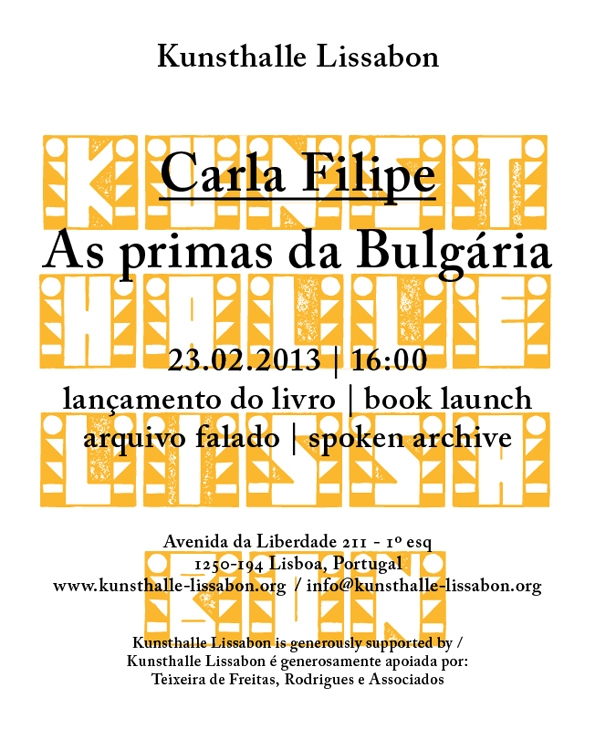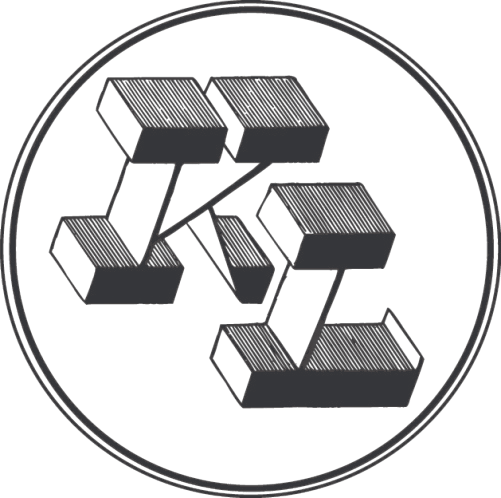-
Lou Vives | Ritmos y poemas
New performance | East Lisbon Art DayKunsthalle Lissabon takes part in the East Lisbon Art Day and presents the new performance by Lou Vives, part of his exhibition "Ritmos y Poemas".
Where and When:
📍 Rua José Sobral Cid 9E, Lisbon, Portugal 1900-289
📅 APRIL 5th, 2025
🕖 17:30
Don't miss it!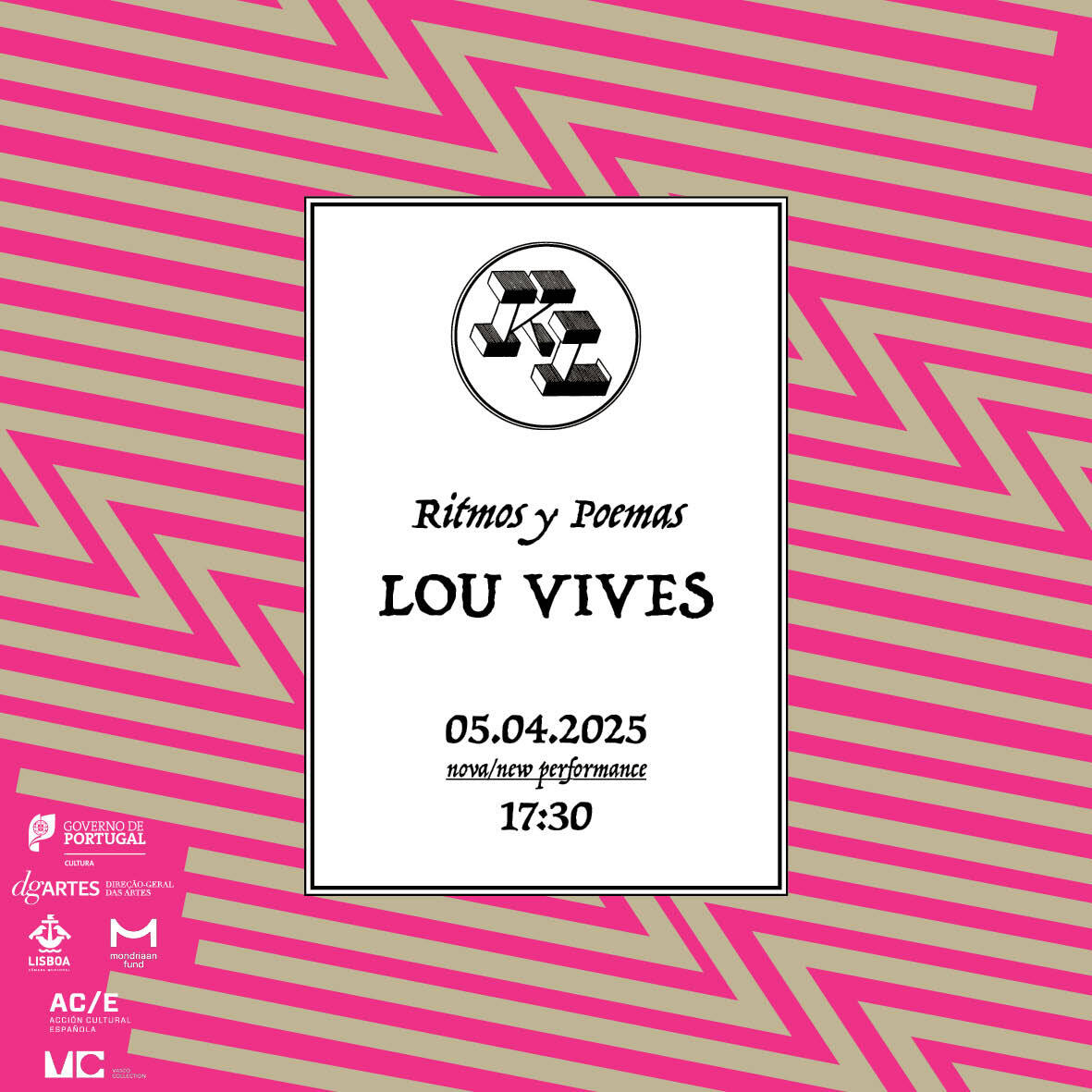
-
Kunsthalle Lissabon at ARCOmadrid | Book launch Thunder in our Hearts
KUNSTHALLE LISSABON will be at ARCOmadrid’s Speakers’ Corner to present Thunder in our Hearts: Kunsthalle Lissabon 15 years, a book commemorating the 15th anniversary of Kunsthalle Lissabon, highlighting its more than 60 exhibitions and impact on both Portuguese and international Contemporary Art.
Who, Where, When
🙂 João Mourão, Luís Silva talk to Teresa Solar Abboud and Naufus Ramírez-Figueroa
📍 IFEMA, Forum Auditorium, 9th Pavilion, MADRID
📅 MARCH 9, 2025
🕖 14:00 - 14:30
Don’t miss out!

-
Kunsthalle Lissabon in Helsinki: An Evening of Performances
An Evening of Performances
Lou Gallery and Kunsthalle Lissabon come together for a special evening, bringing Portuguese and Finnish artists into dialogue. Featuring MSL, Odete, Lou Vives and Murrettumeri the night unfolds through sonic and performative explorations.
🔹 MSL (Antti Jussila and Jade Kallio) is a duo that has been working together since 2008, exploring themes of body, gender, and alienation. Their work is characterized by visceral sounds, ambiguous syndromes, and references to popular music icons.
🔹 Odete works at the intersection of performance, text, visual arts, and music. Her practice delves into historiographical writing, using erotics and paranoia as somatic tools for engaging with archival materials. Her speculative biographies of historical figures unfold through elements such as fashion, presence, and sensibility.
🔹 Lou Vives, born in Iberia in 1999, is an artist and performer whose work spans language, performance, and drawing. Vives explores memory, pop culture, and collective authorship, using rehearsal as a space of transition to transform personal experiences and cultural fragments into poetic investigations of identity and time.
🔹 Murrettumeri creates music that evokes deep emotional responses, moving fluidly between genres and artistic mediums. Described as "the best gig ever, honestly" and "blurring the lines between, in, and around genres and mediums of performing" (Jussi Hertz, World Canvas), Murrettumeri has performed at Norberg Festival, Solstice Festival, and Meteoro in Barcelona.
📍rendezvous, Hauhontie 6, 00550 Helsinki
📆15.02.2025
🕢19:00 (Doors open at 18:30)
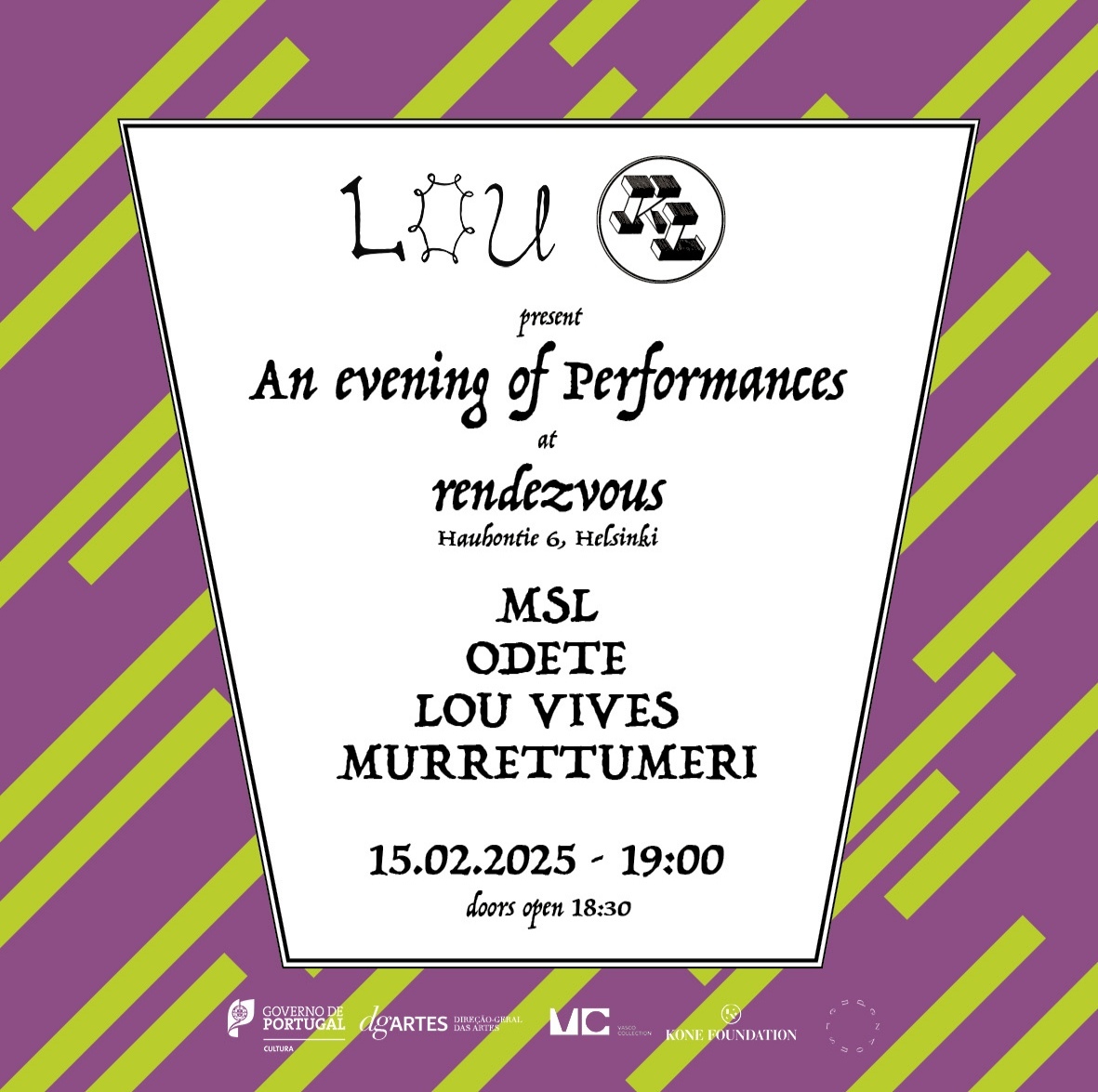
-
Drawing Regeneration
Conversation between Irene Kopelman and Filipa RamosDrawing Regeneration - Conversation between Irene Kopelman and Filipa Ramos
Sunday, November 10, 6pm
The conversation will be held in english.
Irene Kopelman’s work Botryllus Painting – BU, 2022, exhibited at 'Fifteen Years of Love at the Pangolin Republic', is part of a long research project entitled 'Marine Models. Drawing Regeneration', which investigates how small marine creatures are used by scientists to study the regeneration of organisms.
This collaboration brings together the artist, various teams of researchers, and several colonies of Botryllus schlosseri, commonly named star tunicates, the closest invertebrate relative of humans.
Departing from this body of work, and expanding to other projects developed by Kopelman over recent years, this talk will dwell into the ways in which art and science respond and engage with one another. By discussing the manners in which the artist challenges, and contributes to the research methodologies, questions and findings of scientific research, we will contribute to a wider debate on how art is a fundamental tool to know and understand the world.
The work of Argentina-born, Netherlands-based artist Irene Kopelman is built on a long-term engagement with ecological issues and an interest in the parallels between the practices of science and art. She considers her work as forms of embodied knowledge: the image, together with the process that precedes it, provides knowledge of a given environment. These images are also the embodiment of the methodologies and systems that we use to generate knowledge and to make it visible, creating her own systems of representation through art making. Over the past decade, she has accompanied many field expeditions with scientific researchers and spent time in numerous research labs, accumulating a wealth of knowledge about our natural environments and the intricate ecological processes of a variety of geographies. Her recent works have explored scale and colour through topics including water, glaciers and plankton.
Filipa Ramos, PhD, is Lecturer at the Arts Institute of the HGK/FHNW, Basel. Her research focuses on how contemporary art engages with nature and ecology. Ramos has been curator of the Art Basel Film sector (2020-24) and co-founded the online artists’ cinema Vdrome). Current projects include BESTIARI, the Catalan representation at the 60th International Art Exhibition – La Biennale di Venezia (2024) and the festival The Shape of a Circle in the Mind of a Fish (since 2018, with Lucia Pietroiusti). In 2024, she curated Songs for the Changing Seasons, 1. Klima Biennale Wien and in 2022, Persons Personen, 8th Biennale Gherdëina (both w/ Lucia Pietroiusti). In 2021, she co-curated Bodies of Water, the 13th Shanghai Biennale.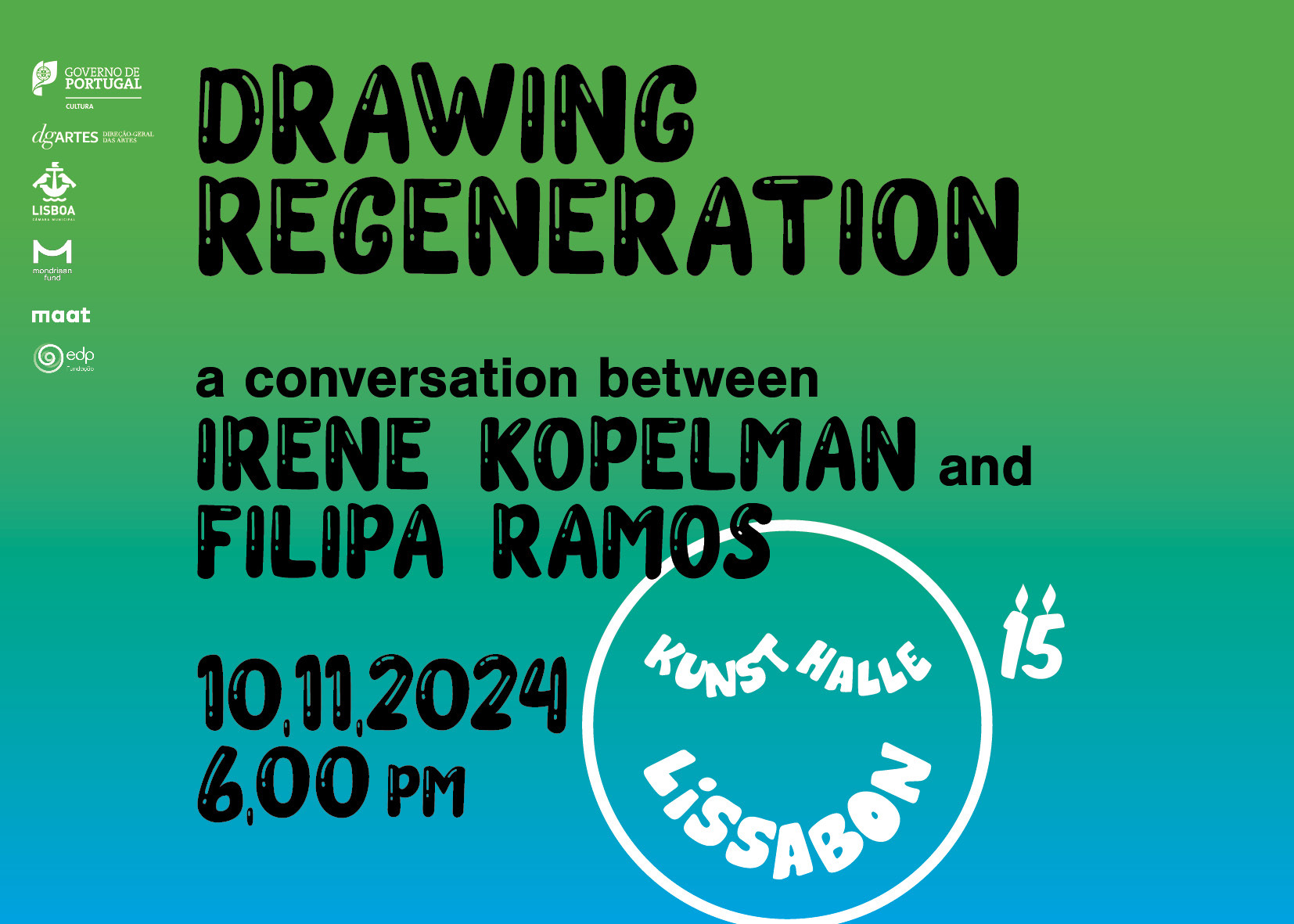
-
Coreia # 11 x Sâlmon
Publication LaunchLaunch of the special edition created in collaboration with the Sâlmon International Performing Arts Festival in Barcelona.

-
Book Launch 'Thunder In Our Hearts'
Launch of the Kunsthalle Lissabon's 15th anniversary book.
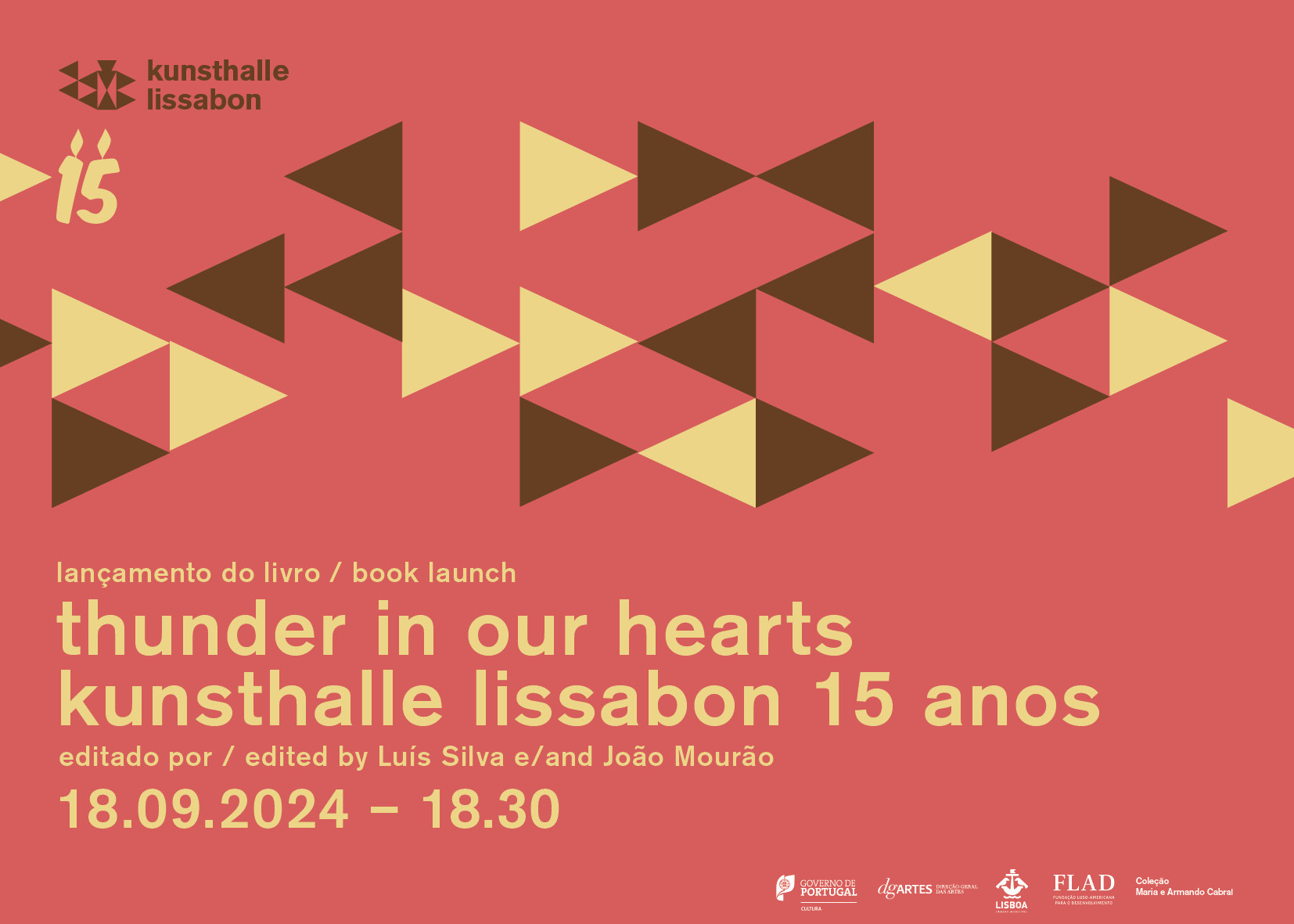
-
Palavras, Tecidos e Pedras
Conversation on and around the Sicilian Antigruppo + creative poetry workshopPalavras, Tecidos e Pedras. Conversation on and around the Sicilian Antigruppo + creative poetry workshop
Saturday 9 th March, 5 pm
The Sicilian Antigroup was a poetry movement born in 1968 and active until the 1980s around three cultural epicentres in Sicily: Palermo, Trapani, and Catania. The thematic fulcrum of the 'movement' revolves around the idea of poetry as revolutionary action and the desire of the group's adherents to involve the population through systematic recourse to the square, together with the instruments of the 'poetic struggle': recitals, debates meetings, wall poems, distribution of mimeograph poetic texts. The encounter between antagonistic action (praxis) and the literary word (poiesis) constitutes for the members of the Antigroup the germ of an authentic applied political alternative.During the event at Kunsthalle Lissabon, REPLICA intends to share with the public an overview of the international experience of the movement and to convoke, through the organization of a workshop coordinated by Maria João Petrucci, the spirit of the poets who wore on different occasions their poems on shirts or wrote them on unusual supports. The workshop will invite people to embrace the spirit of the Antigroup, creating their own poetic manifesto and translating verses onto unconventional canvases such as shirts, napkins, or stones.
BIOGRAPHIES
REPLICA is a research collective founded by Lisa Andreani and Simona Squadrito in 2019 that focuses on studying, analyzing, archiving, and exhibiting the countless forms of artist's books and modern and contemporary independent publishing.
Lisa Andreani is a curator and art historian. Currently, she is Curator and Assistant to the Artistic Director at MAXXI (Rome). In 2023 she was the Curatorial and Exhibition Coordinator of Panorama L’Aquila, a city-wide exhibition organized by ITALICS. She has been a co-curator of: After. Festival diffuso di Architettura in Sicilia. From 2020 to 2022 she was the Curatorial and Editorial Coordinator at MACRO – Museum for Preventive Imagination (Rome). In 2019 she was a fellow of the Global Modernism Studies research program at the Bauhaus Dessau Foundation (Dessau) in collaboration with the Victoria & Albert Museum (London). She coordinated the production of Romanistan (2019), a film by Luca Vitone. In 2019 she co-founded REPLICA, a curatorial and research project investigating artist books. She has collaborated with various institutions and publishers including Fondazione Arnaldo Pomodoro (Milan), Fondation Carmignac (Paris-Porquerolles), Humboldt Books (Milan), and Mousse Magazine & Publishing (Milan), NERO Editions (Rome), Spector Books (Leipzig). Since 2018 she has worked as an archivist and researcher for Archivio Salvo becoming part of the Scientific Committee.
Simona Squadrito is a lecturer, critic, editor, and independent curator. She teaches Creative Writing and Phenomenology of Contemporary Arts at the MADE program in Syracuse and Contemporary Methodologies and Techniques and the Latest Trends in Visual Arts at IED in Milan. She is co-founder of REPLICA, an Italian artist's book archive, and KABUL magazine, a cultural association, independent publishing house, and contemporary art and culture magazine. An author of essays for Postmediabooks, Skira, AgenziaX, and Nomos Edizioni, she writes for several magazines and collaborates with Nero Magazine for which she edits "Archive Actualized": an interview format that aims to explore some Italian and international artist book archives and bibliographic studies. With the curatorial and research project REPLICA, she was the winner of the Italian Council XII Edition call promoted by the Ministry of Cultural Heritage. From 2015 to 2020 she was director of Villa Vertua Masolo, a civic museum in Nova Milanese.
Maria João Petrucci is currently an art teacher at Arq. Vitor Palla Elementary School, and runs the educational program KL KIDS of Kunsthalle Lissabon. Maria João has a BA in Painting from FBAUL and in 2020 concluded the ESEIMU’s Post-Graduation in Artistic Practices and Pedagogical Processes. Between 2014 and 2018 Maria João lived in Venice, where she did an Erasmus Exchange Program at the Accademia di Belle Arti di Venezia, and where she worked as a supervisor at the educational and pedagogical project “Sale in Zucca'' of the Cultural Association MOMOS, collaborated with the educational program of BarchettaBlu Association, and strongly embraced the coordination of the Casa Punto Croce cultural project along two years. In the most recent years, she published three printmaking books: Pedro (Edizioni DoppioFondo, 2017), Here and There (Edizioni DoppioFondo, 2018), Ultravioleta (Edições FICA - Oficina Criativa, 2022). Between 2019 and 2023 she worked for the Association 1,2,3, Macaquinho do Xinês, running the following projects in Lisbon: Brincapé and Território Brincapé.
Kunsthalle Lissabon is supported by República Portuguesa / DGArtes. The project “Sicilian Antigroup: a trans-local study” is supported by the Italian Council (12th edition, 2023), a program for the international promotion of Italian art by the Directorate-General for Contemporary Creativity of the Italian Ministry of Culture.
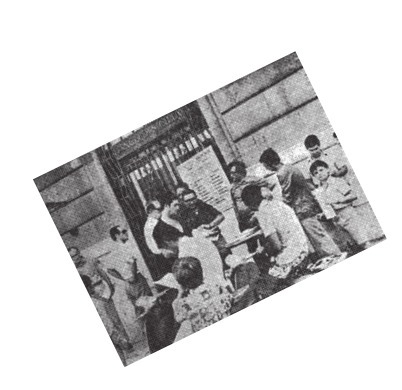
-
Screening: Isadora Neves Marques, Pedro Barateiro
Lançamento do livro: Federico Herrero.Screening: ‘Becoming Male in the Middle Ages’ by Isadora Neves Marques, and ‘Monologue for a Monster’ by Pedro Barateiro
Cero Uno, San José, Costa Rica
30.09.2023 - 15:00
Book Launch: 'Carefully Painted Yellow Areas' by Federico Herrero
Espacio Abra, San José, Costa Rica
30.09.2023 - 17:00
Kunsthalle Lissabon is kindly supported by República Portuguesa/ DGArtes, Câmara Municipal de Lisboa, Coleção Maria and Armando Cabral.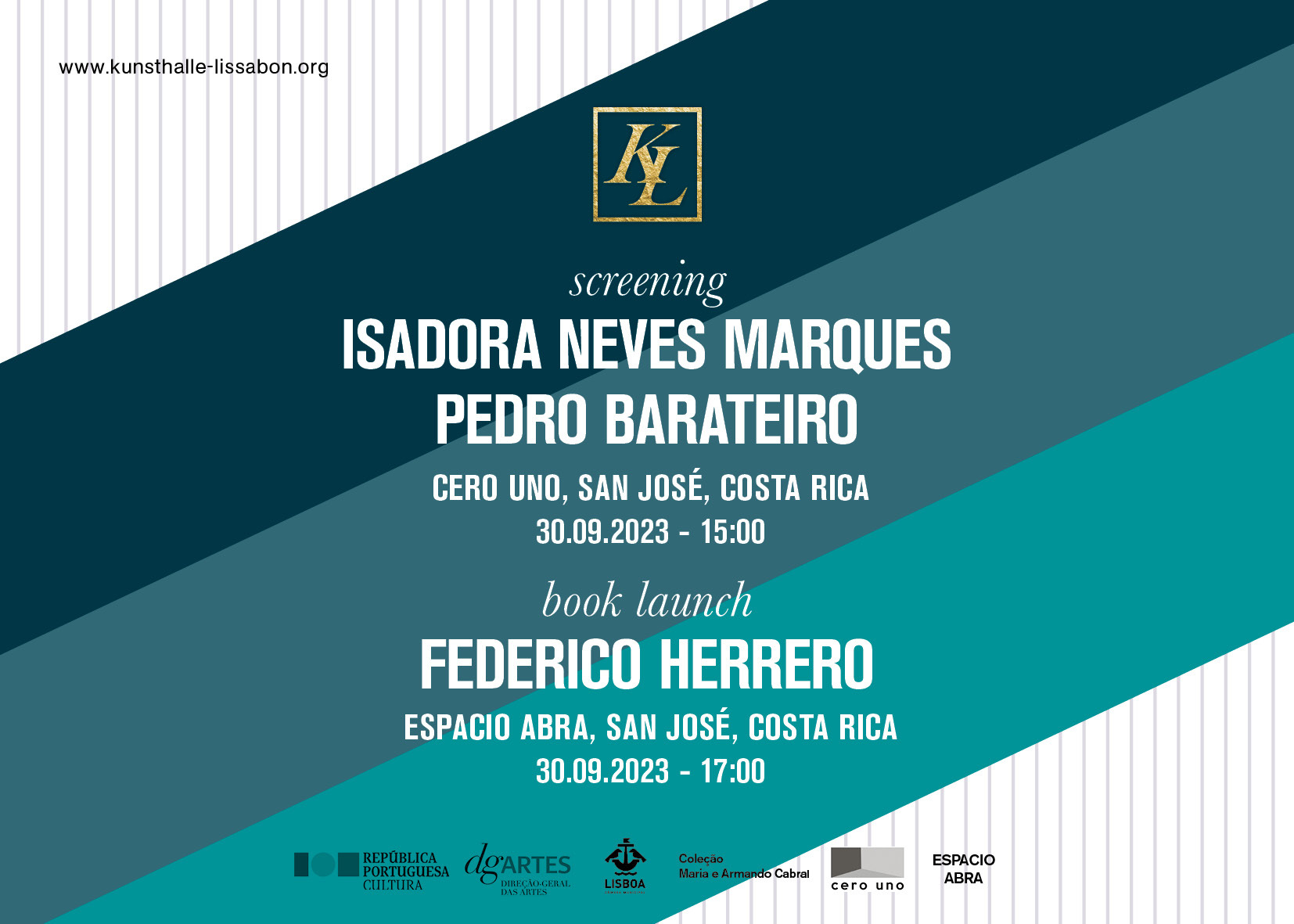
-
Book Launch: Noite Solar Dia Lunar / Solar Night Lunar Day
Mariana Caló | Francisco QueimadelaBook launch of the first monograph dedicated to the work of Mariana Caló and Francisco Queimadela published by Kunsthalle Lissabon.
Edited by Filipa Ramos, Luís Silva & João Mourão, Mariana Caló & Francisco Queimadela, who also contribute to the text along with Andrea Lissoni.
Many thanks to graphic designer Pedro Nora & printers Grafica Maiadouro, as well as our sponsors and supporters República Portuguesa / Direção-Geral das Artes, Câmara Municipal de Lisboa, Coleção Maria e Armando Cabral, and Ágora - Cultura e Desportivo do Porto. And of course, huge thanks to Matéria Prima - Atelier Sérgio Rebelo for providing the space to showcase this fantastic body of work.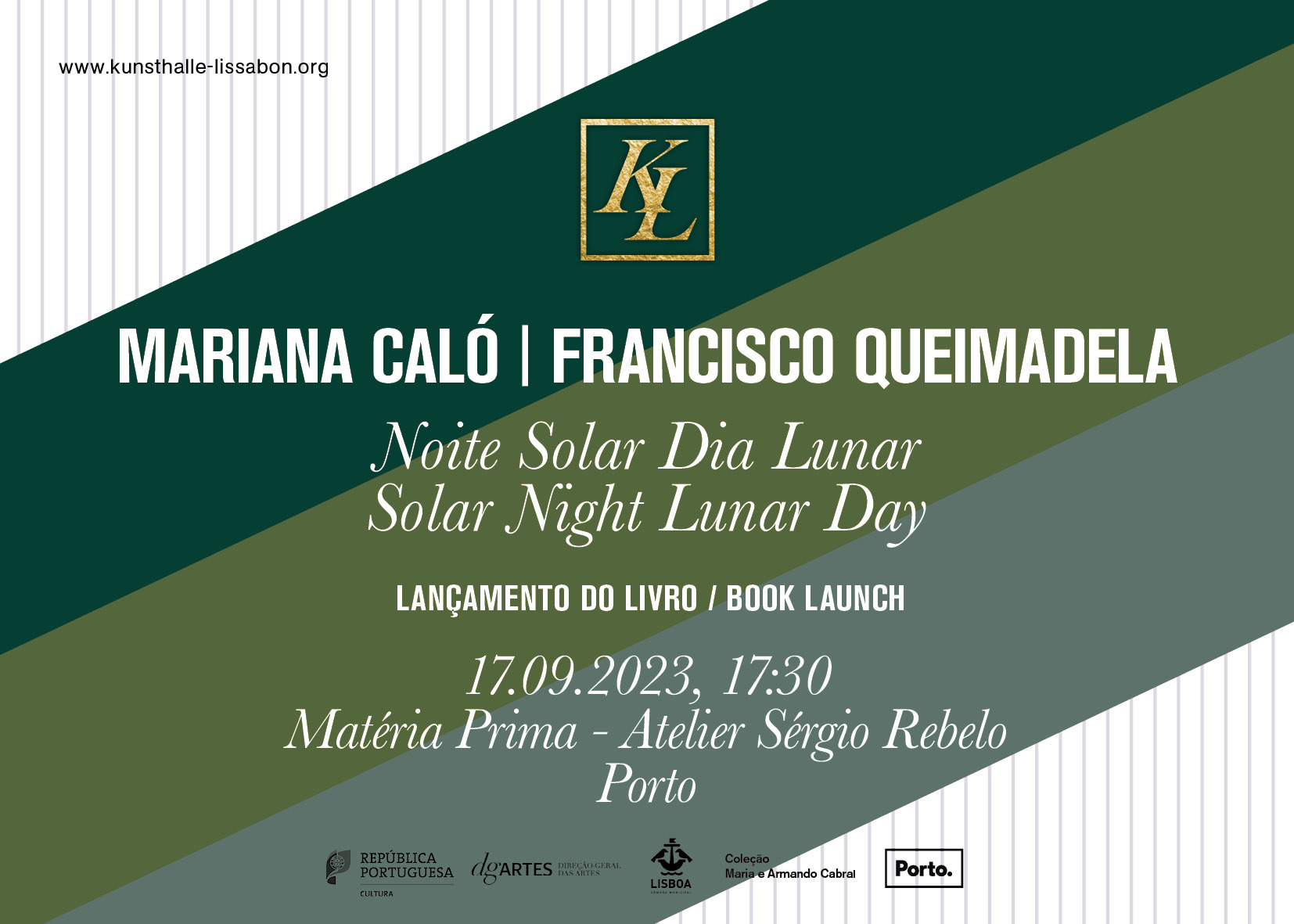
-
Para uma ciência mais acessível
Conversation between Mariana Duarte e Mariana AlvesAs part of the public program of the Lysis project, by Diana Policarpo and Odete, the artists invite Mariana Duarte and Mariana Alves to a conversation about the different media and tools used for the dissemination and democratization of science.
“Lysis” is a transdisciplinary visual arts project focused on the works by the artists Diana Policarpo and Odete, which proposes the (re)configuration of feminist science fiction in Portugal, especially in its relationship with disciplines such as Bioethics and Paleontology, exploring dynamics between art, science, power structures and regimes of truth. This is a research project that the artists have developed through their readings about speculative fiction, science history, and feminist movements. As a method of research and sharing, they propose to learn and transform their practices through the relationship with other artists and thinkers, opening part of the process of creation to a public program. From the various phases of this project (research, production, presentation, and circulation), a new artistic project will emerge and will be presented as an exhibition at the LEHMANN+SILVA gallery in the summer of 2023.
BIOGRAPHIES
Mariana R.P. Alves is a postdoctoral researcher in science education and communication at CIDTFF-University of Aveiro. Since 2012, Mariana has participated, founded and led several initiatives about science and society in different countries and in various forms (from radio broadcasting to art and science) on a voluntary basis. Moreover, she was project leader of “Democratization of Science at Gulbenkian Collaborative Center” for one year. She is co-director of “Cartas com Ciência”, work that was distinguished by Top 100 Women in Social Enterprise 2021. Mariana's research focuses on young people's sense of belonging in science.
Mariana Duarte (b.1988) is a journalist for Público, where she writes about performing arts, music, visual arts, and politics. She is editor of MIL Magazine, a magazine associated with the festival MIL - Lisbon International Music Network. Among the press, she has participated in the Reading “Manuals for Teatro Nacional São João”, she has written exhibitions press release and coordinated the editorial program for the Rivoli Já Dança! cycle. More recently, she moderated interviews for the podcast Ao Fim e ao Cabo, a project by Ao Cabo Teatro directed by Luís Araújo, and contributed to the online publication Recurso 2021, which results from the training program with the same name developed by the company Estrutura. She lives in Porto.
This project is generously supported by República Portuguesa / DGArtes
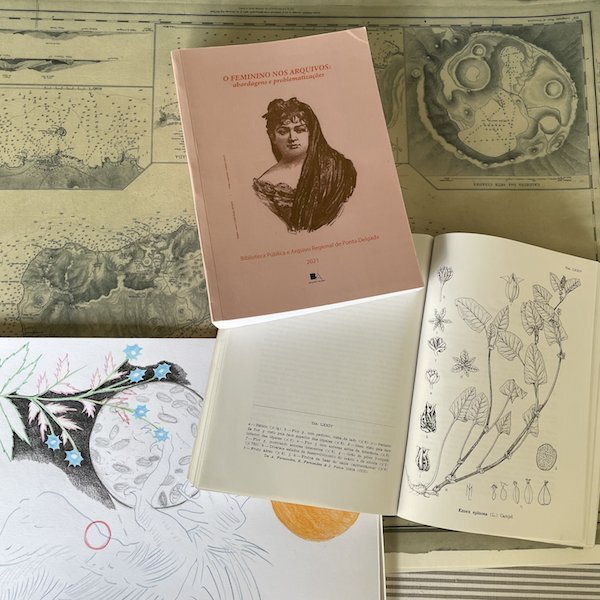
-
Kunsthalle Lissabon
Breath in, print outKunsthalle Lissabon presents Breath in, print out a series of conversations dedicated to five editorial projects whose dedication to limitless self-expression testifies to the underlying need to structure one's body and identity before diving into the overwhelming collectivity.
Starting from the 20th of May Kunsthalle Lissabon will host: pântano books/livros do pântano; Hamam Magazine; a presentation of “Unknown Language” by Huw Lemmey edited by Ignota Books; Phile Magazine and Frankenstein Magazine.
Within this new editorial scenario, both artistic and otherwise, a large number of publications are increasingly focusing their attention on the care of the self. Some emphasizing the importance of caring through the improvement of desire, relaxation, and spirituality, some others promoting new ways of improving one's researches while avoiding any labels and restrictions.
The growing interest of these magazines, books, and editorial projects in an inner rather than an outer growth is clearly an interesting feature to be explored in order to understand not only the implications and the benefits of these practices but also the needs that have stimulated such type of approach to art and knowledge in general. Focusing the attention on their contents and structures, the aim of Breath in, print out is to analyze the paths the editorial production may take in the near future as well as those it has already taken. Digging into the needs that led to the production of these particular projects and inside the minds of their creators is a way to guarantee a prolific exchange between our local community and all the invited participants. Moreover, during the entire summer period, it will be possible to buy and consult the publications made by the invited editorial projects directly in the Kunsthalle Lissabon’s library.
Kunsthalle Lissabon is supported by Ministério da Cultura/DGArtes and Coleção Maria e Armando Cabral. The event Breath in, print out is generously supported by Collezione Agovino, Naples.
20 May - pântano books/livros do pântano / Youtube video of the event
3 June - Hamam Magazine / Youtube video of the event
24 June - Ignota: Unknown Language by Huw Lemmey and Hildegard of Bingen / Youtube video of the event
8 July - Phile Magazine / Youtube video of the event
15 July - Frankenstein Magazine / Youtube video of the event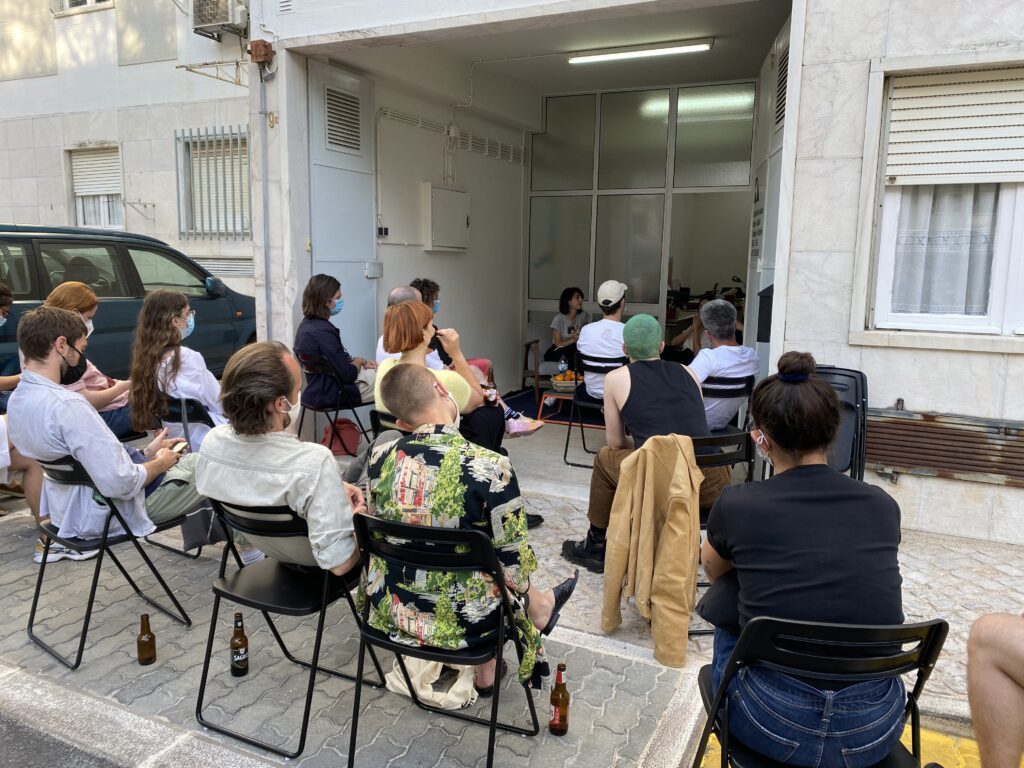
-
Kunsthalle Lissabon
Oops!...I cooked it againThree weeks after reopening from a year-long sabbatical Kunsthalle Lissabon had to close its doors due to the COVID-19 pandemic. It felt frustrating and disheartening to go into withdrawal again. Togetherness and friendship are part of our institutional DNA but those qualities are temporarily vetoed as likely carriers of the infection.
Over the years, we have been to countless restaurants together, we cooked for people and were treated to beautiful home cooked meals in return. In the process we made incredible shows and books together.
It seems unlikely for the near future to spend time together, to enjoy each other’s (physical) company, to cook for and share a meal with people we love. We know we will miss that. We already do. Everyone does. In response, and throughout countless WhatsApp groups, live feeds, any available social media actually, friends are sharing recipes and images of what they are cooking.
There is way too much free time on our hands these days, some would say. True. But we say that since we can’t share an actual meal with our friends we exchange instructions and photos of those meals. Chains of people cooking gnocchi from scratch have been established and they are spreading, in what could be called a sort of togetherness by proxy.
We experience the joy of eating together the best we can given the conditions we live in. Alone in our apartments we engage in the digital partaking of our individual experiences of cooking and eating as if we were sitting at the same table laughing, eating and drinking. We share recipes because we want others to feel the same we do, we want to be part of a community of shared experiences because that is what keeps us human. In a way, togetherness is what you make of it.
We will start sharing recipes with you. We will ask our friends, people who have been part of our life for the past decade, whether artists, curators, writers, technicians, sponsors, audience, etc, to share their recipes with us and with you. We want to feel that food still connects us, that it still brings us together despite social distancing. We want to not be isolated and food can help us in breaking the distance between each other. Needless to say this is not about art. Sometimes art is not the answer, food is.
Alberta, Arantxa, João and Luís.
Illustration by @arantxa_abad
Follow our recipes here:
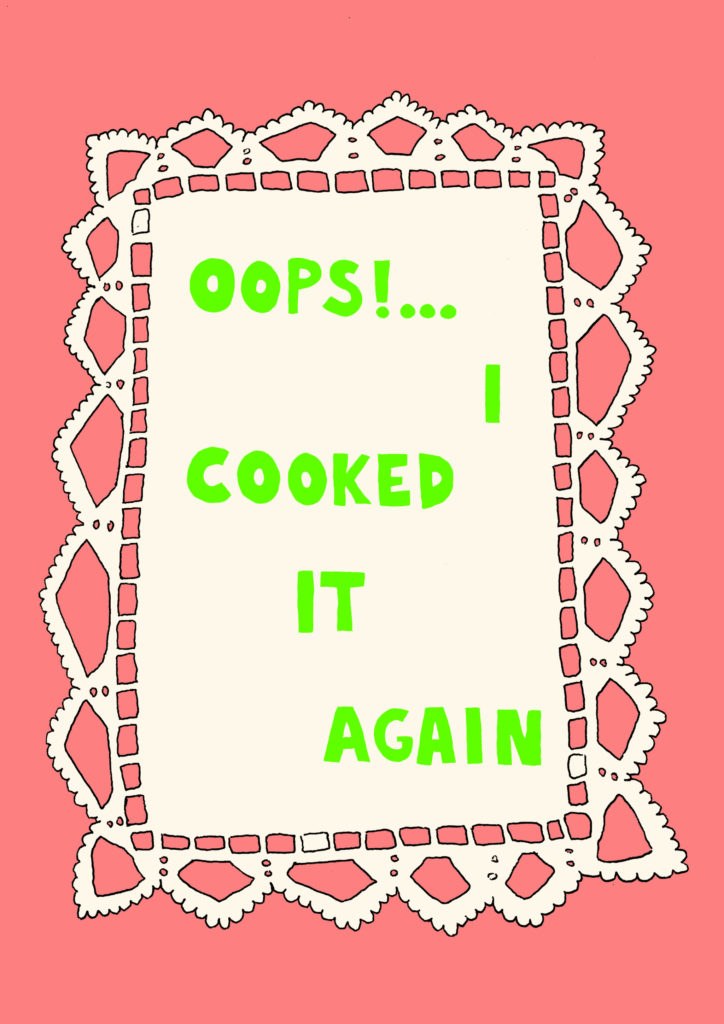
-
Joana Escoval e Nuno da Luz
Beast of Gravity Living MetalsBeast of Gravity Living Metals
twilight walk
13.02.20, 19.00
Estufa Fria De LisboaBeasts of Gravity derives from the homonymous LP record created by Joana Escoval and Nuno da Luz, in collaboration with the label The Vinyl Factory, Fiorucci Art Trust and Kunsthalle Lissabon. During the walk, the audience is invited to activate Living Metals - small-scale sculptures by Joana Escoval to be worn or hand-held by the audience, while immersed in a specific sonic environment. That evening, Nuno da Luz will play a wind song
Register at info@fiorucciartrust.com
Capacity limited to 30 participants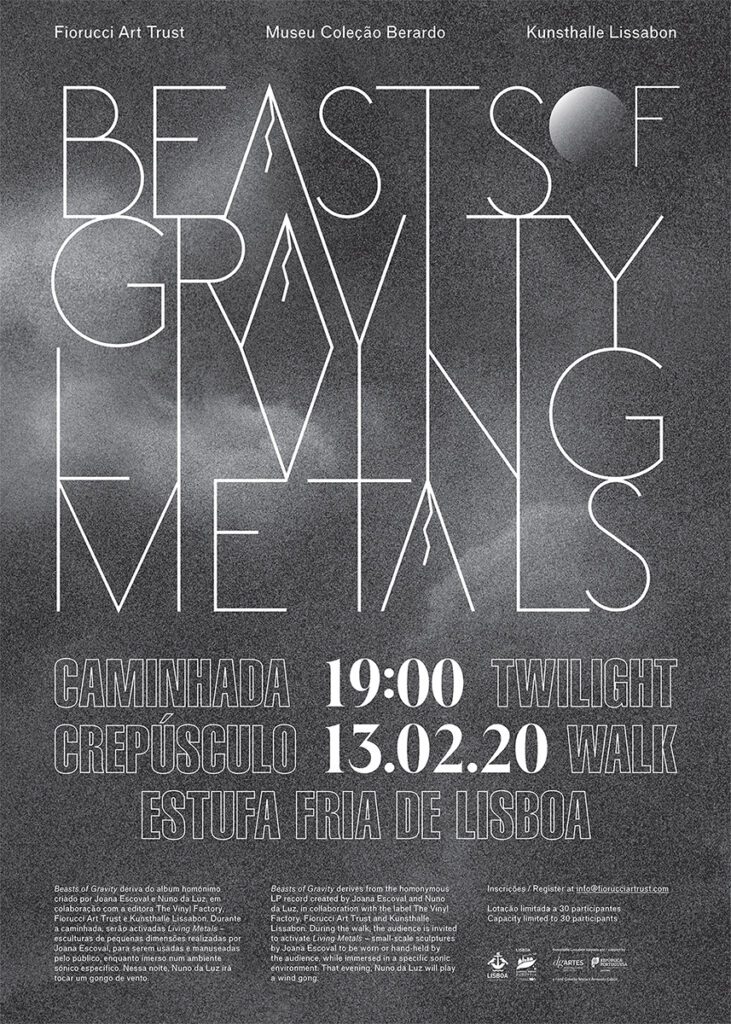
-
Valentina Desideri e Denise Ferreira da Silva
Sensing SalonThe Sensing Salon is a studio practice, conceived by Valentina Desideri and Denise Ferreira da Silva, that expands the image of art beyond objects, events, and discourse to include the healing arts. Through formats that facilitate collaborative studying and experimenting with different practices and tools for reading (e.g. Tarot and Astrology) and healing (e.g. Reiki and Political Therapy), it fosters a form of sociality that attends to our deeply implicated existence.
For this occasion, the Sensing Salon will assume a two-parts format: a private study group (with guests) during four days (Tuesday 14th to Friday 17th January) which will culminate in an open-sharing of the process on Friday the 17th January evening and a one-day public symposium, on Saturday the 18th January.
The study group will gather guests who will take part in the symposium, as well as Lisbon-based artists, activists and intellectuals. The study group will depart from the question that closes Arjuna Neuman and Denise Ferreira da Silva’s film Serpent Rain (2016): “what would become of the human being if expressed through the elements?” A question inspired by the sense that the grip in metaphysics of linearity (and its attendants onto-epistemological descriptors, such as separability and fixity) has on our imagination accounts for the prevalence of violence in modern global existence. From experimenting with practices and tools that presume deep implicancy (such as Tarot, Reiki, Astrology, etc.), over five years now, we found that, among other things, they create a form of sociability that does not presume the fundamental separability that prevails in philosophical, social, scientific and commonsensical representations of existence. An important aspect of these practices is that the classic elements (air, fire, water and earth) and correspondence (or similarity) constitute their lexicon and grammar. By framing the question(ing) of the human being around the possibility of describing it using the elements, we hope to create a study space to explore the possibilities that open up when similarity replaces linearity as the metaphysical basis for thinking and existence.
The study group will gather for 4 days (from Tuesday 14th to Friday 17th January) and dedicate each day to the study of the human being through one element. We have invited guests to frame the work on each element and open up some possibilities of rethinking the category of the Human being through their practice and the way it relates to that element. The 4 guests are:
- Air (abstraction, formal cause, interpretation, shape, power as rule): Mark Harris is an academic and former land rights lawyer working on themes related to indigenous rights and water.
- Fire (transubstantiation, final cause, creation, beginning, power as energy): Jota Mombaça is a writer and performer who has worked on the relation between humanity and monstrosity, the end of the world, anti-colonial justice and visionary fiction.
- Earth (motion, generation, material cause, raw material, consolidation, power as oppression): Kobe Matthys/Agency is an activist and artist whose practices include permaculture and other sustainable methods.
- Water (Distillation, relation, efficient cause, nutrient, extraction, power as relation): Stacey Ho is a Vancouver-based artist whose work explores intimacy through building relations which may be expressed as infusion as well as writing.
On Friday the 17th of January, at 7pm, we will host an open event where all that we were able to gather and experiment will be shared with a wider public, together with Arjuna Neuman and Denise Ferreira da Silva’s film Serpent Rain (2016).
On Saturday the 18th of January, we will host the symposium Toward a Transformative Theory of Justice, which will elaborate on the questions that guide this iteration of the Sensing Salon. We will attempt to weave together the Elements, our guests’ practices and the ways of thinking about Justice that those open up. Raquel Lima will give the keynote lecture.
For more information:
https://kadist.org/kcc/not-fully-human/
KADIST believes contemporary artists make an important contribution to a progressive society, their work often addressing key issues of our time. KADIST, a non-profit organization dedicated to exhibiting the work of artists represented in its collection, encourages this engagement and affirms contemporary art’s relevance within social discourse. Its programs develop collaborations with artists, curators and many art organizations around the world, facilitating new connections across cultures. Local programs in KADIST’s hubs of Paris and San Francisco include exhibitions, public events, residencies and educational initiatives. Complemented by an active online network, they aim at creating vibrant conversations about contemporary art and ideas.
Location
Hangar - Artistic Research Center
Rua Damasceno Monteiro, 12
1170-112 Lisboa
https://hangar.com.ptThe Kunsthalle Lissabon is kindly supported by República Portuguesa / DGArtes, FfAI, Coleção Maria e Armando Cabral. Additional support for Sensing Salon is provided by Calouste Gulbenkian Foundation and Canada Council for the Arts.
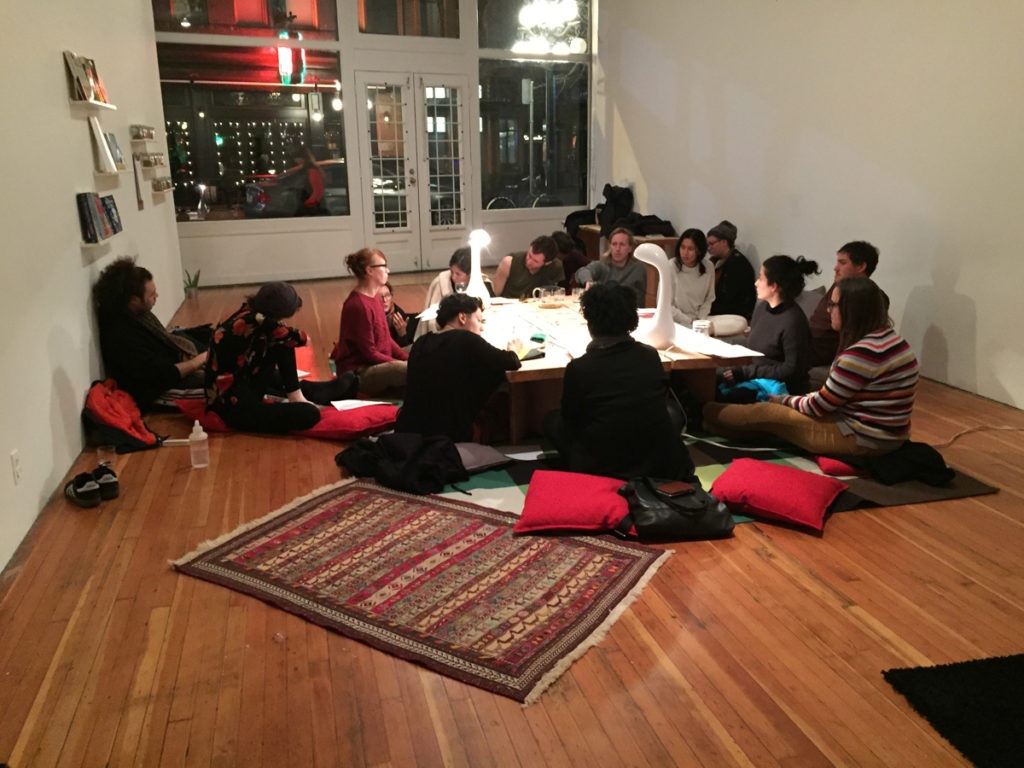
-
Christophe Daviet-Thery
GRID #6Eddy Merckx is pleased to announce the sixth appointment with the project GRID, to be held in Lisbon as part of the CURA.'s take over of Kunsthalle Lissabon.
GRID was created to investigate the many elements underpinning the choices and passions of the actors involved in books made by artists and made around art.
For every appointment, an exhibition of books capable of recounting the encounters, loves and experiences, will be organized on the limited space of a library shelf, as a minimum unit of a complex structure. The library, conceived also as a cultural and experiential grid, will then host a guest in one of its spaces who will be responsible for addressing the contents, drawing on its collection of books, objects or works of art related to books.The guest curator of this sixth meeting of GRID is Christophe Daviet-Thery, a bookseller and publisher in Paris since 2001. He describes the show he will present as follows:
Numerous artists have been so fascinated by colour, or have reflected so profoundly on it, that their names have become associated with certain ones, such as Yves Klein with blue, and Ad Reinhardt with black. Colour is a central element of the history of art, and such an essential component of many artists’ work that movements have been characterised by them: Der Blau Reiter, Fauvisme...
And yet colour, which by definition is visual, is absent here, or virtually so.
It is not a question of being interested in its retinal nature, its function or the symbolism underlying it, but rather in its representation via a conceptual approach.
Roland Barthes wrote, “When I buy colours, it is by the mere sight of their name.” (Roland Barthes by Roland Barthes, translation by Richard Howard, Hill & Wang, 2010)We name it in order to represent it.
From May until August 2019, CURA. has been invited to take over the Kunsthalle Lissabon: its spaces, the exhibition programme as well as its entrance plaque will all be involved in an identity exchange and appropriation project. On this occasion, CURA. presents the continuation of its ongoing programme at BASEMENT ROMA with a project on doubling as well as otherness.
The GRID project is curated by Eddy Merckx, providing a working platform based on collaboration between the figure of the critic and that of the collector. Eddy Merckx wants it to be an experimental workshop on the unexpressed potential of the figure of the collector in today’s art world, accompanied by the problematizing vision of the art critic, in an original curatorial partnership.
On the occasion of GRID #6, Eddy Merckx will publish a fanzine.
Christophe Daviet-Thery (www.daviet-thery.fr): “Being a bookseller means choosing and recommending. it means asserting one’s subjectivity, whilst excluding an exhaustive approach. Being a publisher means conceiving the most accurate and meaningful form. Being a curator means confronting, rethinking content as form. Three professions that share books and bookshelves. If we are to consider art as an everyday experience, we are prompted to question the notion of appropriation, which the book, as a medium, enables. When it isn’t a collector’s item, a book is a familiar object, one which is identifiable and of everyday use, and whose economical format makes it readily available to a wider audience and in a certain way democratic. To purchase a book is a cultural and political act. A book is a nomadic object, one that can be slipped in a pocket, taken along everywhere, like professor Kein in Elias Canetti’s Auto-da-fé who always had a book. One by one, they come together to shape a library, a space for all possibilities and encounters, of which Jorge Luis Borges said: ‘I’ve always imagined paradise to be a kind of library.’ A library arises from juxtaposition, not accumulation. The book is apprehended in a transversal manner, by comparing it to various media, the interest in its use arising on the basis of the context in which it appears. These intersections give the bookseller’s profession a broader definition, ranging from that of a curator of projects such as vis-à-vis or je déballe ma bibliothèque, to that of an editor when a book needs to be thought of as an exhibition space as it was for Allan Kaprow. Posters. With this constant redefining of the profession comes the notion of complementarity, because like the library, projects come about as additions symbolized by the &.”
Photo:
Cindy Sherman Untitled Film Still #13, 1978
Collection MoMA, New York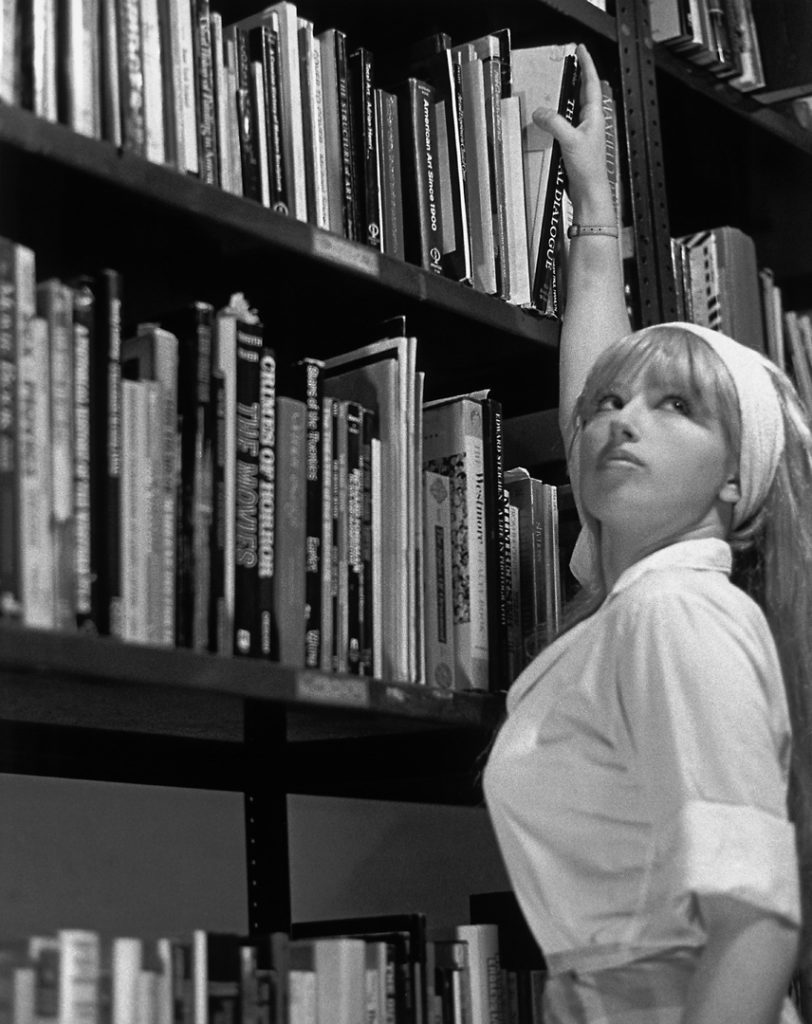
-
Maria Thereza Alves
Book Launch Recipes for SurvivalSunday Feb. 24, 18h
Pivô @ Kunsthalle Lissabon has the pleasure of presenting Recipes for Survival, by artist Maria Thereza Alves, with an introduction by Michael Taussig.
In 1983, when acclaimed Brazilian artist Maria Thereza Alves was an art student at Cooper Union in the United States, she returned to her native country to document the backlands of Brazil, where her family is from. Working with the local people in a collaborative process that has become the hallmark of her mature work, Alves photographed their daily lives and interviewed them to gather the facts that they wanted the world to know about them. Unlike documentation created by outsiders, which tends to objectify Brazil’s indigenous and rural people, Alves’s work presents her subjects as active agents who are critically engaged with history. Following the images are texts in which the villagers matter-of-factly describe the grinding poverty and despair that is their everyday life—incessant labor for paltry wages, relations between men and women that often devolve into abuse, and the hopelessness of being always at the mercy of uncontrollable outside forces, from crop-destroying weather to exploitative employers and government officials. Though not overtly political, the book powerfully reveals how the Brazilian state shapes the lives of its most vulnerable citizens. Giving a voice to those who have been silenced, Recipes for Survival is, in Alves’s words, “about we who are the non-history of Brazil.”
This event is co-organized by Giulia Lamoni and Gillian Sneed. The book launch will include a short reading by the artist, followed by a conversation between Alves and Sneed.
Maria Thereza Alves is a Brazilian-born artist descended from the country’s indigenous, African, and European peoples. She is best known for her award-winning work Seeds of Change (2004–2018), which links ecology and colonial history. One of the founders of Brazil’s Green Party in São Paulo, Alves received the 2016–2018 Vera List Center Prize for Art and Politics, awarded to artists who take great risks to advance social justice in profound and visionary ways.
Gillian Sneed is an art historian and independent curator currently based in Lisbon. Her research focuses on contemporary Latin American art and feminist art histories across the Americas. She is a Ph.D. candidate in art history at the Graduate Center of the City University of New York, and she has written for Women’s Art Journal, Flash Art, AWARE Magazine, Art in America, and Texte zur Kunst.
Pivô @ Kunsthalle Lissabon is generously supported by República Portuguesa - Direção Geral das Artes, Foundation for Arts Initiatives and Maria and Armando Cabral Collection.

-
F.R.David
Book Launch "what I mean is—"Please join us Sunday, November 18 for the Lisbon presentation of “what I mean is—”, the 16th issue of F.R.DAVID, co-published by uh books and KW, Berlin:
from 4pm
With a screening of Juliana Canal Paternina’s “GLORIA", and some words by editor Will Holder:F.R.DAVID is concerned with the organisation of reading and writing in contemporary art practice. […] Typographers normally design using other people’s words and eventually accept a situation in which they are limited to making only slight modifications in a given text even when a syntactic rephrasing could make the message more understandable. […] The intention is not to provide a course in typographic history or style, but to provide experiences based on language as communication of a perceptual/cognitive idea or event, language as presented visually—enhancing perceptual meaning, and language as invention or systematic structure. […] I’m the robotic kid looking through digital eyes past the windshield into the pre-invented world […] Material, that is to say unformed or unshaped matter, is the field where authority blocks independent experimentation less than in many other fields […] 15—Craft’s gestural intelligence is apt to discover material potential only by internalising and inhabiting the specificities of a tradition. This tradition knows JOY IS FORMAL INTELLIGENCE. CRAFT’S TRADITION IS JOY […] The resources of expressive art have never been cheaper, the productivity of the individual expressive artist has never been higher, the accomplishment of a density of surface effects in contemporary artworks has never been easier to bring about. […] it is not so much what we want as what we want to want, or what keeps us wanting […] plastic, wondrous plastic! ideal for the girl on the go, easy to care for, hard to care about, plastic. whether it’s a fast escape from an unhappy household, or running for dear life down some dark alley, plastic works for you. […]
Kunsthalle Lissabon is generously supported by República Portuguesa - Direção Geral das Artes, Maria and Armando Cabral Collection and Teixeira de Freitas, Rodrigues e Associados. Additional support by Pólo Cultural Gaivotas-Boavista /CML.
-
Naufus Ramírez-Figueroa
Book Launch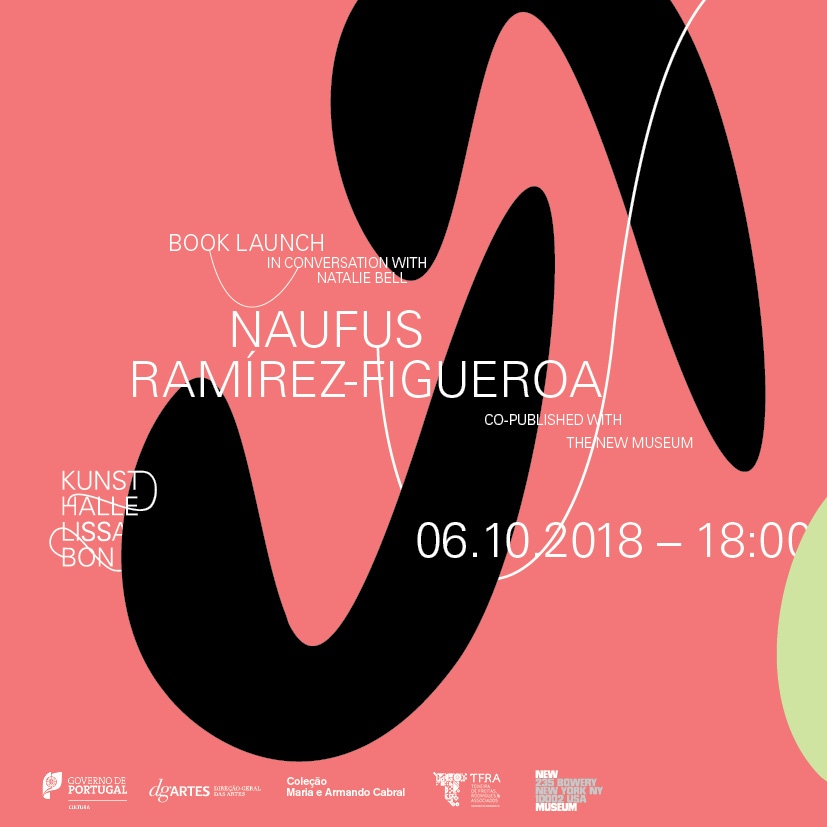
-
Irene Kopelman
Lançamento do livro Indexing Water: Notes on representation #9Kunsthalle Lissabon is happy to present Indexing Water, an artist book by Irene Kopelman, the ninth volume of her ongoing series titled Notes on Representation. Indexing Water concludes the research project Kopelman developed around the colour of water, which had already materialized in a solo show at Kunsthalle Lissabon in December 2017.
Indexing Water is designed and co-published by Roma Publications.
Irene Kopelman (1978) is an Argentinian artist based in Amsterdam. She studied at the School of Arts at the National University of Cordoba where she obtained her bachelor's and master's degree in painting (1994 - 2002). In 2002, Kopelman was accepted within the two-year international residency program at the Rijksakademie van beeldende Kunsten in Amsterdam. In the Netherlands, Kopelman began researching the representations of landscapes as recorded by 18th and 19th century naturalists. This period of exploration, during the age of the Enlightenment, is richly archived in museums across the world. A series of collaborations within museum collections such as the Geological Museum (Artis, Amsterdam), the Entomological Collection (University of Amsterdam-UvA), the Teylers Museum (Haarlem), the Natural History Museum in London and the Astronomical Observatory in Cordoba (Argentina) led towards various projects including exhibitions at The Drawing Centre, New York (2007), Apex Art, New York (2008), Le Plateau, Paris (2009), Gasworks, London (2012) and La Verriere Fondation D’Entrerprise Hermes, Brussels (2013). Her proximity to institutions led Kopelman to begin observing the methodologies of scientists at work in the field and ignited curiosity as to how they framed and organized a subject that was vast, essentially dispersed, extremely dynamic and simply too hidden to grasp or approach all at once. This led Kopelman to spend a period of time at Manu Learning Centre, Madre de Dios, Peru in 2012, following which she joined a group of 40 scientists from Malaysia’s Sabah Parks and The Netherlands Centre for Biodiversity Naturalis (NCB) on an expedition to Mount Kinabalu in Malaysia. A long-term collaboration with STRI (Smithsonian Tropical Research Institute) in Panama began in 2012 and continues. STRI has developed an extensive infrastructure for the study of biodiversity on the Panamanian Isthmus and Kopelman's partnership with this institution has enabled her to explore subjects such as lianas, marine invasive species, mangroves and fiddler crabs particular to the region. An association with the World Glacier Monitoring Service (WGMS) and the Swiss Federal Institute for Snow and Avalanche Research (SLF) have helped inform and propel her study of glacier landscapes and alpine ecosystems. This development occurred over a period of residency at the Stiftung Laurenz-Haus, Basel in 2013.
Kunsthalle Lissabon is generously supported by Ministério da Cultura/DGArtes, Maria and Armando Cabral Collection and Teixeira de Freitas, Rodrigues e Associados.
The book Indexing Water is generously supported by Mondriaan Fund, Royal Netherlands Institute for Sea Research and Carl von Ossietzky University of Oldenburg.
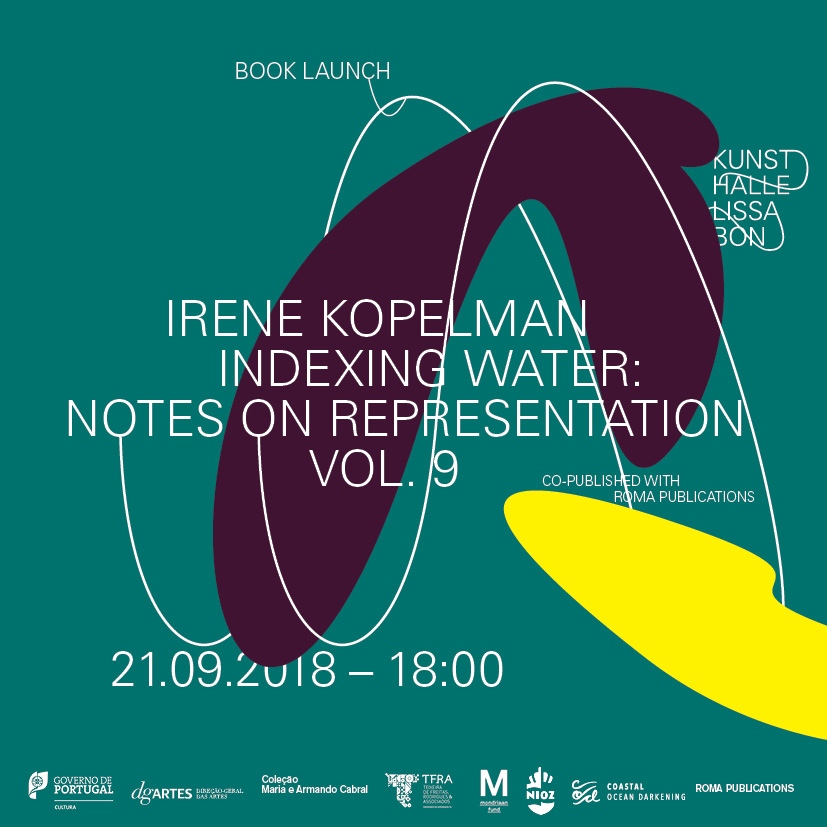
-
Henning Lundkvist
Leitura do livro Planned Obsolescence - A RetrospectivePlanned Obsolescence — A Retrospective
Henning Lundkvist"It is true that I had accumulated a lot of cultural capital, but like so many others I had never found a way to convert it into cash."
With this first sentence of Planned Obsolescence—A Retrospective, the anonymous narrator—suspiciously similar to the book's author—begins a rhythmical rant, a 100-plus-page long exercise in repetition, variation, and a severe lack of punctuation. In this monologue spoken by a voice who could equally be the narrator or the hordes of others in the same position, he makes up bad excuses for why his career as an artist and writer hasn't taken off as planned; he explains why he prefers to work in a bar rather than produce new artworks; and he moans over the conversion of Europe's picturesque cities into expensive theme parks for tourists due to low-cost flights and Airbnb. Finally, he dreams up a way to halt the extreme inflation of cultural capital and make the world a better place.
Spoiler alert: it doesn't work.Henning Lundkvist is an artist and writer living in Copenhagen.
Planned Obsolescence — A Retrospective
Henning Lundkvist
ATLAS Projects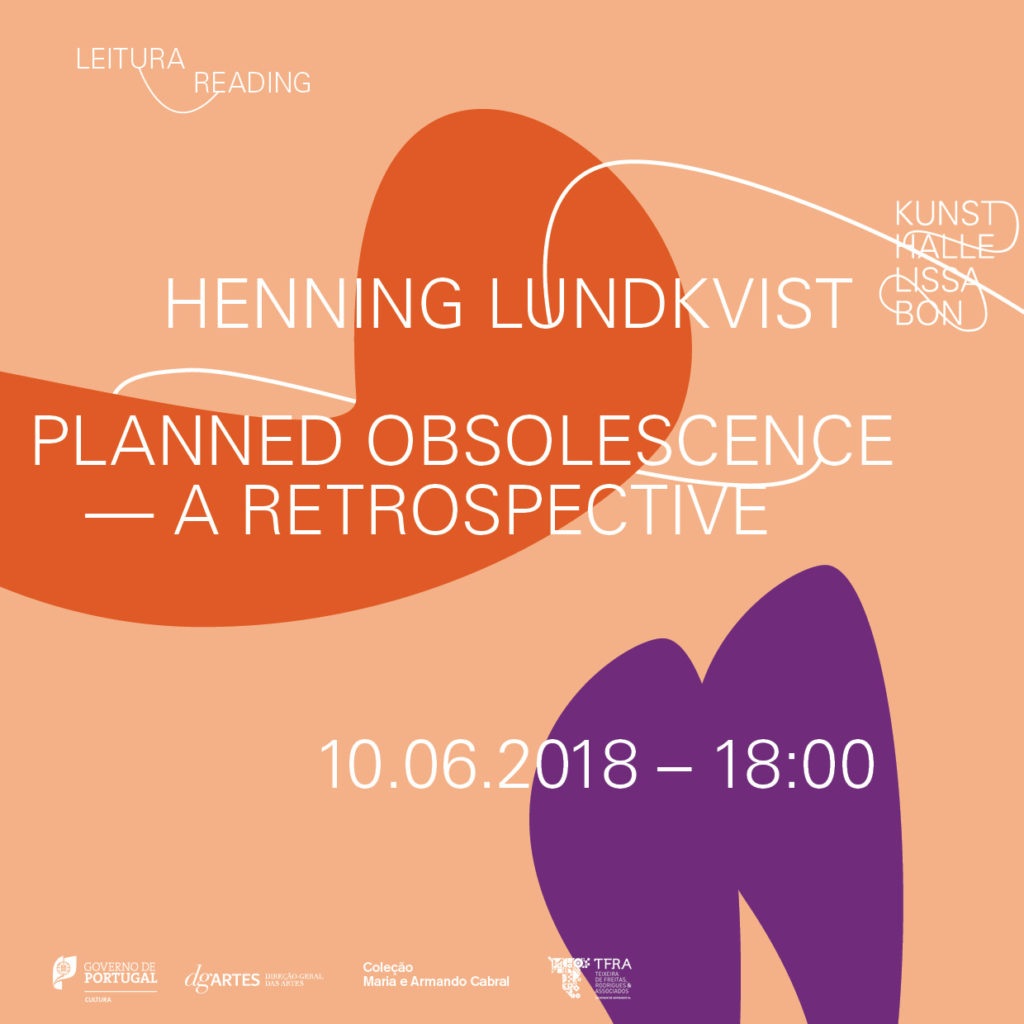
-
Pedro Barateiro
How to Make a Mask book launchKunsthalle Lissabon presents How to Make a Mask, a monographic volume dedicated to the work of Pedro Barateiro. The book was developed during almost three years in close and intense contact between the artist, the editors João Mourão and Luís Silva and some elements of ATLAS Projectos, who worked on the graphic project. How to Make a Mask is co-published by Kunsthalle Lissabon and Sternberg Press with the support of Galeria Filomena Soares and Netwerk Aalst.
How to Make a Mask collects texts and visual work by Lisbon-based Pedro Barateiro. The publication spans a period that dates back to 2008 and features extensive visual and written material of key projects presented in solo exhibitions, as well as other relevant installations, videos and performances. How to Make a Mask borrows its title from one of Pedro Barateiro’s performances presented for the first time in 2011 at Old Schoo1 #3, in which the artist reflects upon the role of the individual in the collective socio-political situation through references ranging from psychological tests to the history of theatre. By sharing the same title as the performance the publication acknowledges the central role this piece has attained in terms of understanding and articulating Barateiro's ongoing inquiry into what modes of being in the world we are able to (re)produce.
Projects collected in this volume can thus be thought of as having been made before or after the performance How to Make a Mask. Those that predate the performance tend to emphasize the over-theatricality of art making in the West, reflecting on the spectator dictatorship in a post-capitalist world. Works such as Domingo, Teoria da Fala/Theory of Speech and Theatre of Hunters, for instance, address the collapse of the notion of modernity and its insistence in the human-non human binary, through a critique of the position of the author, a position romanticized throughout most of the twentieth century, as well as the role of the spectator as actor. Projects postdating How to Make a Mask tend to reflect on ideas of distribution, on immaterial practices, ranging from writing/typing on our computers to “liking” on our social media feeds, and on the growing importance of writing for big corporations through big data and other non-participatory activities. Projects like The Sad Savages, Feitiço/Spell and Prova de Resistência reflect on the need for maintaining forms of resistance vis-a-vis changes brought into effect by post-capitalism, while claiming for the need of an awareness towards the role humans have in drastically changing the planet.
New essays have been specially commissioned to Anders Kreuger, Ana Teixeira Pinto and Els Silvrant-Barclay and Pieternel Vermoortel. Kreuger’s text focuses on Pedro Barateiro’s major solo exhibitions (Theory of Speech, Casa de Serralves — Museu de Arte Contemporânea de Serralves, 2009; Theatre of Hunters, Kunsthalle Basel, 2010; Palmeiras Bravas/The Current Situation, Museu Coleção Berardo, 2015) which can, all of them and in more ways than one, be considered 'exhibition-events'. Teixeira Pinto’s essay departs from Michel Serres’s text Parasite to address some concerns present in Barateiro's more recent works, namely the videos The Current Situation (2015) and Currency, currency (2016), while establishing a relation between that concept of the parasite, as the locus where natural and social/ economic plagues manifest themselves as part of our post-capitalist era. Els Silvrant-Barclay and Pieternel Vermoortel's contribution functions as an epilogue of sorts, one that rather than concluding and ending the monograph proposes an alternative way of navigating the works and texts it presents and discusses.
Kunsthalle Lissabon is supported by Ministério da Cultura/Direção-Geral das Artes, Maria and Armando Cabral Collection and Teixeira de Freitas, Rodrigues e Associados.
The Big Five
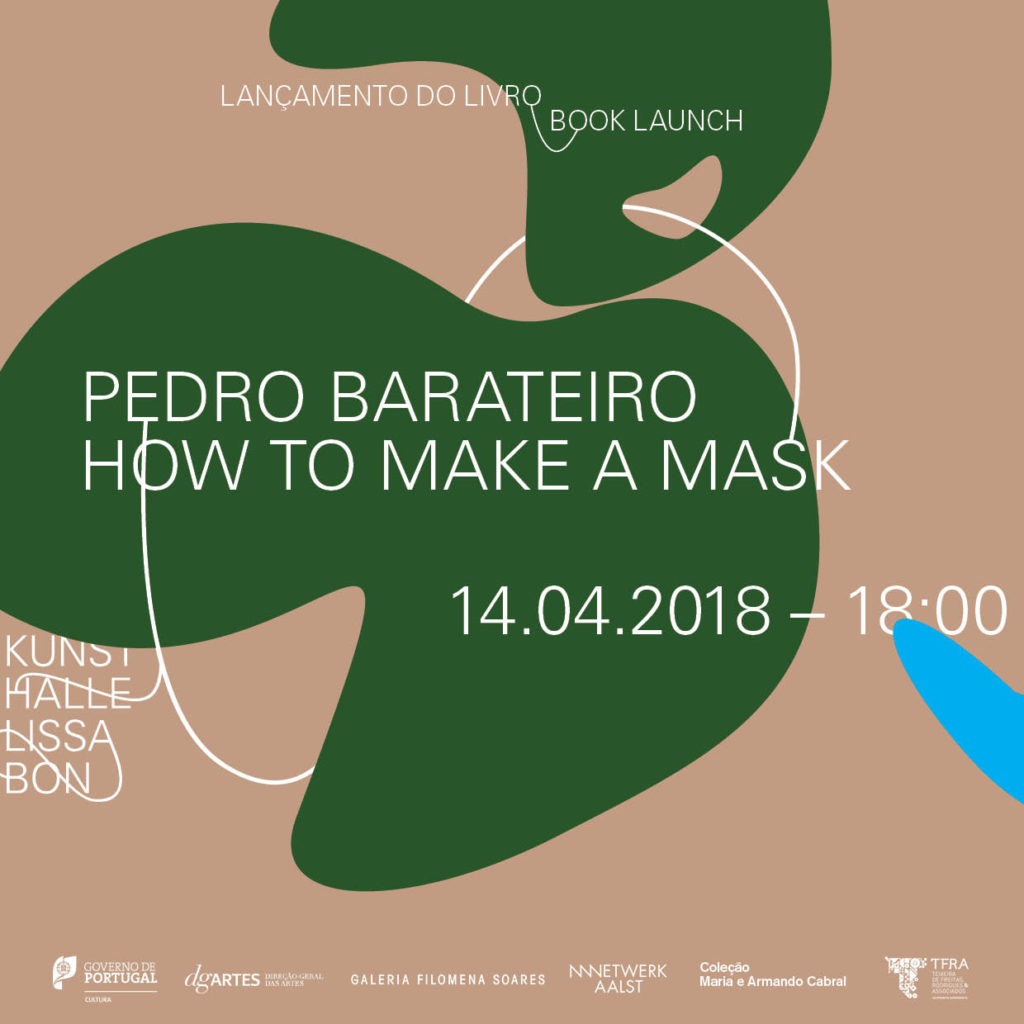
-
Pedro Neves Marques
Lançamento de Morrer na AméricaA Kunsthalle Lissabon e a Arranha Céus Editora têm o prazer de apresentar Morrer na América, uma coletânea de contos de Pedro Neves Marques, escritos entre 2013 e 2016.
“Cheguei à América na semana em que a cidade de Nova Iorque foi atingida pelo furacão Sandy. A chuva fustigava a fachada das Nações Unidas e, com o frio, congelava como uma segunda pele sobre os vidros. Nas ruas, os movimentos sociais estavam em depressão; os ativistas endividados, sem seguro de saúde, sem segurança social. No interior do país, o movimento libertário prometia uma insurreição, armas eram impressas em plástico transgénico e os ambientalistas eram criminalizados e perseguidos. Para lá dos milharais, mais a sul, no Golfo do México, um mar de petróleo exibia as mutações das espécies, a humana incluída.”
O livro, que terá o seu lançamento na edição de 2017 do Festival Silêncio, agrupa cinco contos – O limite das Boas Intenções, Liberator, A Militarização dos Pobres, O Urso e Deepstaria e o Drone – a maioria deles inéditos e que se congregam para e, mais uma vez nas palavras de Pedro Neves Marques, “pensar a Tecnologia e pobreza numa paisagem artificial”.
Pedro Neves Marques é artista plástico e escritor. É o editor da antologia The Forest and the School: Where to Sit at the Dinner Table? (Archive Books, 2015), uma antologia em língua inglesa dedicada à Antropofagia brasileira. Em 2012 publicou um primeiro livro de contos, O Processo de Integração, pela Atlas Projectos. Tem escrito para diversas revistas e catálogos internacionais sobre arte e antropologia, incluindo e-flux Journal, BAK/MIT Press, Haus der Kulturen der Welt, SESC, Sursock Art Museum. Recentemente, estreou a sua curta-metragem Semente Exterminadora no Indie Lisboa Festival de Cinema e teve a sua exposição individual, Aprender a viver com o inimigo, no Museu Coleção Berardo. Nasceu em Lisboa e vive em Nova Iorque.
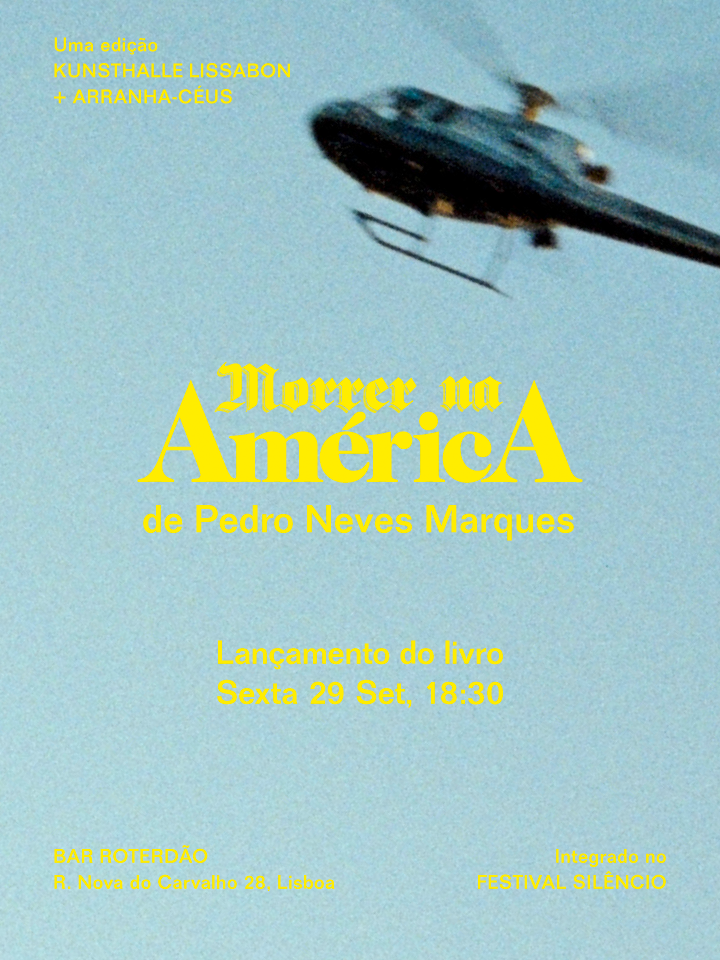
-
Ayami Awazuhara & Christopher Burman
Conversation piece"Just imagine this now — a future where the boring and basic trivialities of the everyday are replaced with a life full of wonder, of joy and of brilliant relaxation.”
'Conversation Piece' is a performative intervention with an audio piece made in collaboration with Christopher Burman, commissioned and first performed at Bob’s Pogo Bar, KW Institute for Contemporary Art Berlin in 2017.
Christopher Burman (b.1986) is an artist from Hackney, London who works across a range of media, including software, installation and writing. He originally studied Architecture at The Bartlett, UCL before co-founding SHOW DOME, an art space in London. He is also a member of STORE Projects, an association of artists and architects who work and teach together.
Ayami Awazuhara (b.1985) is from Japan and has lived in Europe since 2006. She is a current participant in the Maumaus Independent Study Programme, Lisbon, Portugal. She studied fine art at the University of Arts Berlin and was awarded UdK Meisterschülerpreis des Präsidenten 2016. She is the author of several publications among A Heart of a Stone (BOM DIA BOA TARDE BOA NOITE / 2014), the colour orange is named after the fruit orange (UdK / 2016) and others. This year she is going to have solo presentations at fAN Kunstverein, Vienna, Austria and Despacio, San José, Costa Rica.
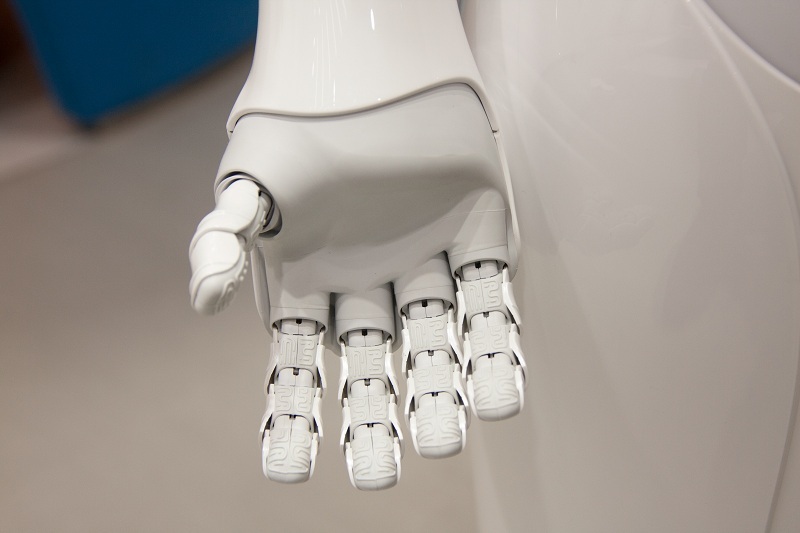
-
Ricardo Valentim
An exhibition in a business card pageA couple weeks ago, the day before coming back to Lisbon from New York, João Mourão and Luís Silva, our co-directors, had brunch with New York based artist Ricardo Valentim. The food was great, as was the conversation. It had been a while since they last met and they wanted to make up for that.
Ricardo brought with him his most recent solo exhibition, titled “An exhibition in a business card page”, in cooperation with Aaron Flint Jamison, Alejandro Cesarco, Ana Jotta, David Horvitz and Sol Lewitt. He put it on the table, next to the food and drinks, and guided João and Luís through the different works in the show. The exhibition is on view by appointment only, you see, and their brunch had just turned into an impromptu appointment to visit the exhibition.
João and Luís were excited by it, by its rhetorical nature, by its performativity, by its portability. What to make of such a project? What to make of a business card page, a on-the-verge-of-obsolescence mode of archiving professional (and personal) information, as the locus for an ambivalent project that riffs on the tropes of exhibition making and artwork making? They asked if Kunsthalle Lissabon could get it on a loan so they could take it with them and have it on view, by appointment only, of course, at their office in Lisbon. Ricardo agreed and passed them the folder containing the business card page and all the additional documentation that comes with an exhibition, press release and artwork list included. They then payed the bill and once on the street went separate ways. A few days later, already in Lisbon, João and Luís received a letter containing the loan release form signed and dated by Ricardo.
Now that all the formalities have been taken care of, Kunsthalle Lissabon is happy to announce that “An exhibition in a business card page” by Ricardo Valentim will be available for viewing, during our regular opening hours. Friday, June 9th at 18:30, Ricardo will be at Kunsthalle Lissabon to give a special tour of the exhibition to anyone who is interested.
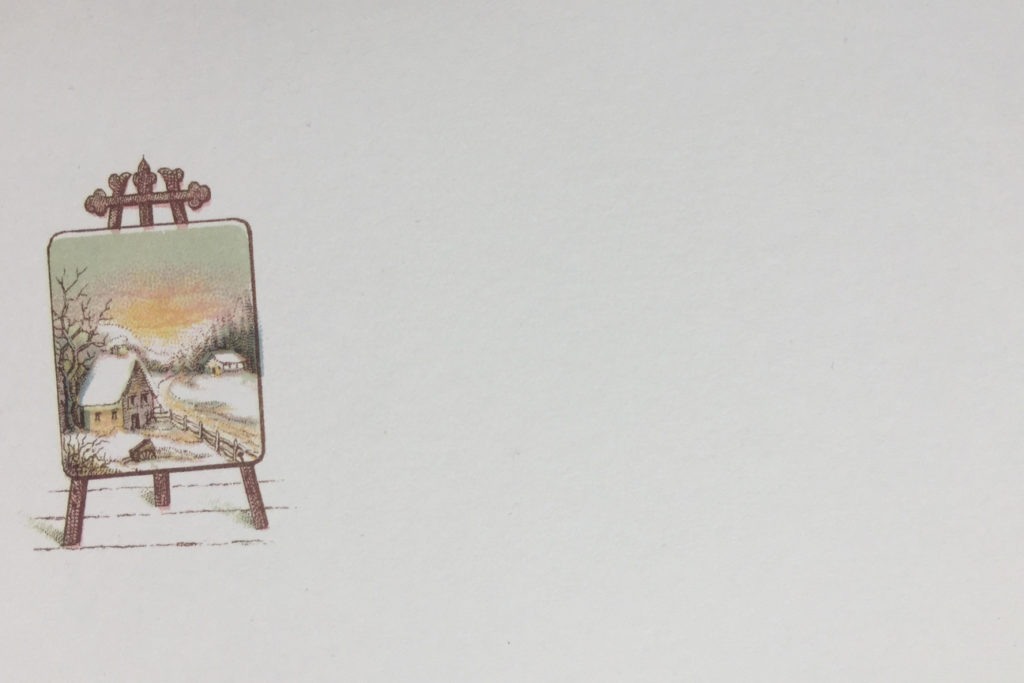
-
Nikolai Nekh
Círculo de leitura 16.02 | 08.03 | 29.03 | 19.04"Because I still like him, I can foresee the impatience of the bad reader: this is the way I name or accuse the fearful reader, the reader in a hurry to be determined, decided upon deciding (in order to annul, in other words to bring back to oneself, one has to wish to know in advance what to expect, one wishes to expect what has happened, one wishes to expect (oneself)). Now, it is bad, and I know no other definition of the bad, it is bad to predestine one's reading, it is always bad to foretell. It is bad, reader, no longer to like retracing one's steps."
Jacques Derrida, The Post Card: From Socrates to Freud and Beyond (Chicago: The University of Chicago Press, 1987), p. 4.
The ‘Circulo de Leitura’ will bring readers together every three weeks for the discussion of the Envois - the first part of Jacques Derrida's The Post Card: From Socrates to Freud and Beyond.
The capacity of the Círculo de leitura is limited.
Nikolai Nekh (Slavyansk-na-Kubani, Russia, 1985) lives and works in Lisbon. In 2009 he completed his degree in Art and Multimedia at FBAUL. He attended the Independent Studies Program at Maumaus during 2010. Collective exhibitions: BesRevelação 2008, Museu de Serralves, Porto (2008); NEW:VISION AWARD, CPH:DOX, Copenhagen (2009); ESCAPE, Lunds konsthall, Lund (2011); Lisboa com Metáfora, Galeria Quadrum, Lisbon (2011). Individual exhibitions: Elefante Preto, Lisbon (2011). Residencies: Zé dos Bois (Lisbon, 2010); La Belle Alliance (Metropole) (Goethe-Institut, Lisbon, 2010); What Happened to God? (Halle14, Leipzig, 2011).
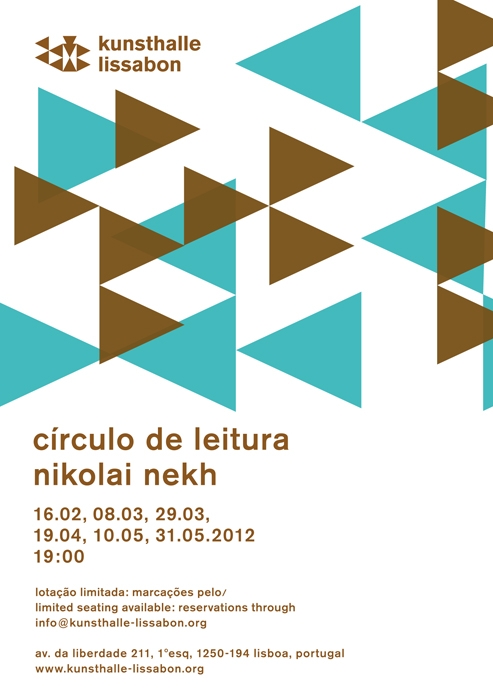
-
Emily Wardill
Projeção Fulll Firearms em Espaço NimasKunsthalle Lissabon presents Fulll Firearms, Emily Wardill's first feature film. Fulll Firearms is a film about a woman who constructs a house to accommodate the ghosts of people killed by the guns of her father’s firearm company. Fulll Firearms was co-commissioned by If I Can’t Dance, I Don’t Want To Be Part Of Your Revolution, Serpentine Gallery, and Film London’s FLAMIN Productions. It was co-produced by FLAMIN Productions and City Projects with support from M HKA, Antwerp, Badischer Kunstverein, Karlsruhe and FRAC Champagne-Ardenne, Reims.
Based on the life of Sarah Winchester and the Winchester Mystery House, Fulll Firearms presents the story of Imelda, a woman haunted by the victims of the guns sold in her father’s company. She uses her inheritance to work with an architect who builds a house for these ghosts. When a group of people squat her half finished building Imelda is convinced that they are the ghosts that she expected. Fulll Firearms is a story of a house built to deliberately disorientate its inhabitants. The narrative touches upon themes of displacement and storytelling, and stands in the tradition of melodrama. The characters find themselves constantly having to adjust their expectations of each other so that they might be able to communicate within each other’s logic. In her films, Emily Wardill creates situations that examine conditions of precariousness in society and how these affect people’s relationships with each other. Her films are fostered by improvisations and workshop sessions, that are set up by the artist to develop themes and characters in a collaborative manner.
Emily Wardill is a London-based filmmaker. She has exhibited widely in the UK and internationally, including solo projects at Artes, Porto (2012); Statens Museum fur Kunst, Copenhagen (2012); Badischer Kunstverein, Karlsruhe (2012); Serpentine Gallery, London (2012); FRAC Champagne-Ardenne, Reims (2012); Contemporary Art Museum St. Louis, St. Louis (2011); de Appel arts centre, Amsterdam (2010); The Showroom, London (2009); the ICA, London (2008); Fortescue Avenue/Jonathan Viner, London (2005, 2006); Standard, Oslo (2008) and the performance event The Feast Against Nature, PS1 Contemporary Art Centre, New York (2004). She has shown at the last edition of the Venice Biennale, Tate Britain, Film Festival Oberhausen, Whitechapel Art Gallery, Witte de With, the London and New York Film Festival, MOCA Miami, was included in The British Art Show 2010/11, won the Jarman Award and showed at MIT List at the end of 2010.
Kunsthalle Lissabon is generously supported by Teixeira de Freitas, Rodrigues e Associados.
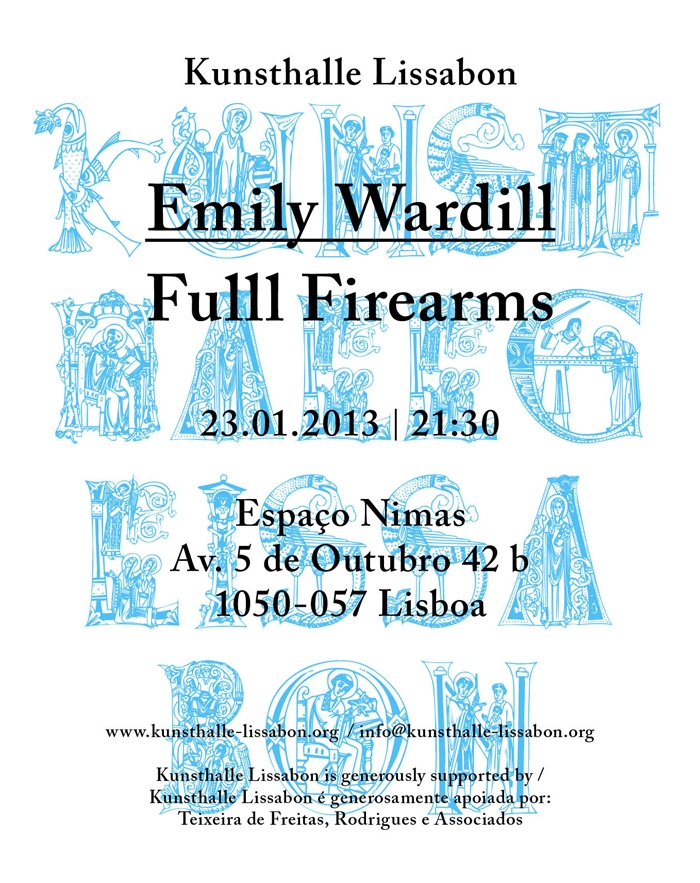
-
Eduardo Guerra
Screening História do tacto | Reading roomA Kunsthalle Lissabon apresenta, pela primeira vez, História do tacto (2011), um projecto de Eduardo Guerra.
História do tacto acompanha, no Instituto de Higiene e Medicina Tropical, um grupo de estudantes coordenado por um médico especialista em doença do sono na aprendizagem do movimento específico de diagnóstico da doença: o apalpe dos gânglios linfáticos ou busca pelo winterbottom sign. O filme procura assim articular o uso do tacto no diagnóstico da doença do sono, método utilizado de modo mais comum na identificação dos sintomas desta patologia. Para tal, utiliza-se um modelo anatómico dos anos quarenta, parte do espólio do Instituto de Higiene e Medicina Tropical, em Lisboa (IHMT).
História do tacto
16 mm, cor, s/som, 9'58''Realização: Eduardo Guerra.
Elenco: Bruno Figueiredo, Cândida Manuel, Carina Martins, Fátima Nogueira, Jorge Seixas, Susana Ferreira.
Equipa: Eduardo Guerra, Gonçalo Pena, Leonor Guerra, Miguel Ferrão.
Montagem: Eduardo Guerra.
Laboratório: Light Film, Kodak.
Agradecimentos: Albano da Silva Pereira, Ana Paula Aguiar, André Romão, Gabriel Abrantes, Galeria ZDB, Gonçalo Pena, Ilda Soares, Inês Castaño, Jorge Seixas, Jorge Simões, Jorge Varanda, Leonor Guerra, Luísa Seixas, Luís Filipe Marto, Miguel Ferrão, Mattia Denisse, Pedro Paiva e João Maria Gusmão.Apoios:
Com o apoio da Fundação PLMJ. Com a colaboração do Instituto de Higiene e Medicina Tropical de Lisboa, Light Fillm, Kodak, Deus ex-machina.Eduardo Guerra (1986; Lisboa) vive e trabalha em Lisboa. Tem participado em diversas exposições das quais se destacam: Bes Revelação, Serralves, Porto (2010/11); Anti-Totem, Galeria Quadrum, Lisboa (2010); Constructing History - the future life of the past, Convento de Cristo, Tomar (2010, um projecto Kunsthalle Lissabon); Do you know about the fall?, Shoreditch town hall, Londres (2008). Em paralelo dirige, em parceira com Miguel Ferrão, o projecto editorial 'Musa paradisíaca'. Frequenta o mestrado em Filosofia-Estética pela UNL e frequentou o B.A. em Visual Arts na UEL, ao abrigo do programa Erasmus (Londres, 2009). Foi artista em residência na Galeria Zé dos Bois (Lisboa 2007) e na Summer Residency, Labor (Budapeste, 2010). Este ano irá integrar o programa de residências Capacete (Brasil) com o apoio da Fundação Calouste Gulbenkian.
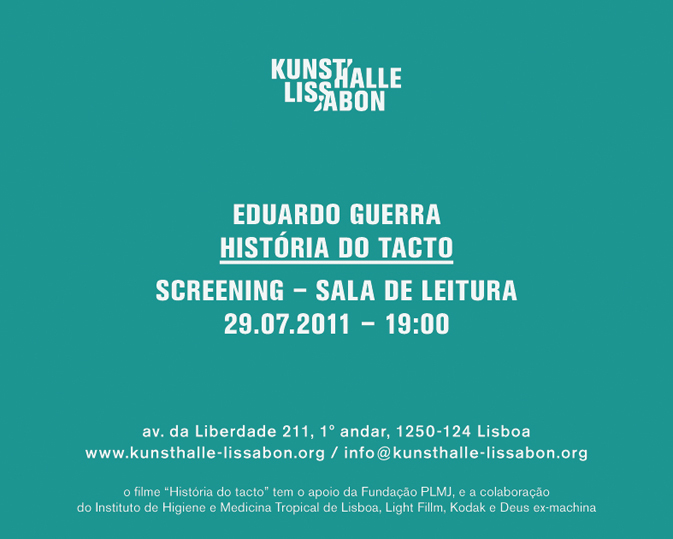
-
Ser uma por duas
uma rádio-novela de Miguel Ferrão com a Tragédia Formiguinha da Boa MorteKunsthalle Lissabon presents Ser uma por duas, a radio show by Lisbon-based artist Miguel Ferrão with 'Tragédia Formiguinha da Boa Morte', and the result of a residency program at Centro Cultural Português - Instituto Camões, in the African island nation of São Tomé and Príncipe.
Ser uma por duas was a performative event in three episodes broadcast weekly by São Tomé and Príncipe's National Radio. Referencing Tchiloli, also known as Tragédia do Marquês de Mântua e do Imperador Carloto Magno (a traditional Sao Tomean theatrical presentation characterized by its anachronisms and performative versatility), the radio piece departed from a previously recorded conversation between the artist and four actors of 'Tragédia Formiguinha da Boa Morte', a local amateur theatre company. The outcome of this collaboration was a staged and set to music reading, performed by the participants of the original conversation, which was re-enacted almost entirely.
The actors and musicians of 'Tragédia Formiguinha da Boa Morte', as well as the characters they play in Tchiloli are: Amâncio Carvalho (Marquês de Mântua), Edlane da Costa (Conde Ganalão), Nélson Vaz (Criada), Nildo Neto (Reinaldos de Montalvão); Álvaro Neto, Célsio Trindade, Hortênsio Santana, Humberto Luís, João da Taraveira and João Amoreira.
Kunsthalle Lissabon is a project financed by Secretaria de Estado da Cultura/DGArtes (Direcção-Geral das Artes). Miguel Ferrão's project Ser uma por duas was supported by the Portuguese Embassy in São Tomé and Príncipe, Instituto Camões and RTP África.
Miguel Ferrão was born in 1986 in Lisbon, where he lives and works. Ferrão studied Painting at Faculdade de Belas-Artes - Universidade de Lisboa, and Philosophy-Aesthetics at Faculdade de Ciências Sociais e Humanas- Universidade Nova de Lisboa. Ferrão recently had his first solo show Prova de Esforço, Centro de Artes Visuais, Coimbra (2011) and a selection of group shows include BesRevelação 2010, Museu de Serralves, Porto (2010); Pequenos Gestos em Lugares Específicos - Junho das Artes, Óbidos (2010); Proximidade da Cópia, Espaço Avenida, Lisbon (2008) and Quinta do Gato Cinzento, Palácio de Valadares, Lisbon (2007). Ferrão is running, since 2010, and in partnership with Eduardo Guerra, the project 'Musa paradisiaca'. In 2011 he was a resident at Centro Cultural Português - Instituto Camões, in São Tomé and Príncipe.
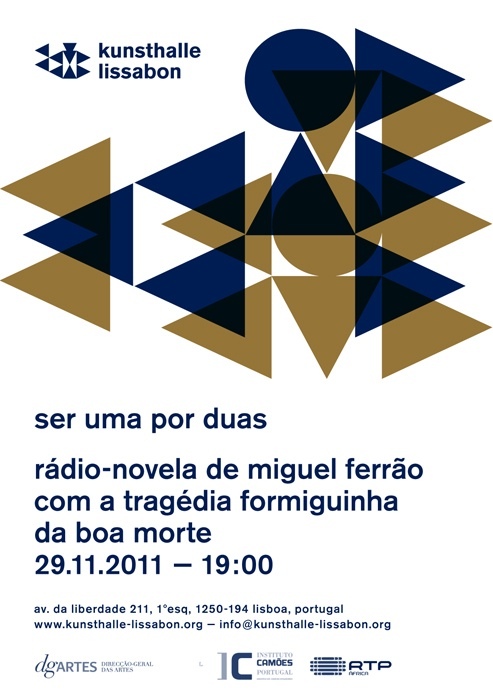
-
Elena Filipovic
Felix Gonzalez-Torres, for example apresentaçãoKunsthalle Lissabon continues its discursive programme by inviting American curator Elena Filipovic, who will present the lecture Felix Gonzalez-Torres, for example.
Focusing on one concrete example—the practice of Cuban-born, American artist Felix Gonzalez-Torres (1957-1996) including how the artist himself curated his own work in his lifetime—this lecture will attempt to trace how the example of the artist as curator might help change our conventional understanding of the terms “artwork,” “curator,” “exhibition,” or “retrospective.” Through a discussion of the recent retrospective Felix Gonzalez-Torres: Specific Objects without Specific Form, we might imagine a way of looking at, talking about, and making exhibitions differently than through the lens of the artist-genius, curator-auteur, and of the exhibition as an unquestionable already-calcified form.
Elena Filipovic is a writer, art historian, and curator at WIELS Contemporary Art Centre, Brussels. She co-curated the 5th Berlin Biennial (2008) with Adam Szymczyk, and co-edited The Biennial Reader: Anthology on Large-Scale Perennial Exhibitions of Contemporary Art (2010) with Marieke van Hal and Solveig Øvstebø. She has curated or co-curated a number of historic retrospectives, including Marcel Duchamp: A Work that is not a Work of “Art” (2008-2009), Felix Gonzalez-Torres. Specific Objects without Specific Form (2010-2011) and Alina Szapocznikow: Sculpture Undone, 1955-1972, co-curated with Joanna Mytkowska (2011-2012), in addition to organizing solo exhibitions with artists such as Klara Lidén, Lorna Macintyre, Melvin Moti, Tomo Savic-Gecan, and Tris Vonna-Michell, as well as group shows including The Other Tradition (2010), Anachronism (2007) and Let Everything Be Temporary (2007). She was guest curator of the Satellite Program for emerging artists at the Jeu de Paume, Paris (2009-2011) and has, since 2007, been tutor of theory/exhibition history at De Appel postgraduate curatorial training program and advisor at the Rijksakademie in Amsterdam. Her writings have appeared in numerous artists’ catalogues as well as Afterall, frieze, Kaleidoscope and Mousse.
Kunsthalle Lissabon is a structure supported by Secretaria de Estado da Cultura/DGArtes (Direcção-Geral das Artes).
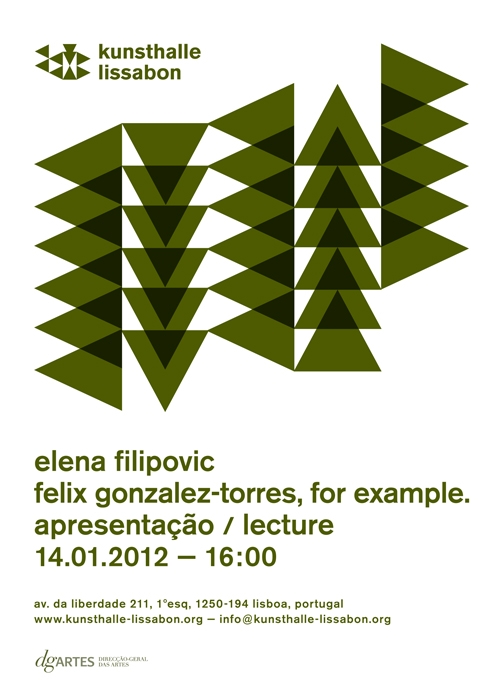
-
Chto Delat?
Realism: Between Tragedy and Farse projeção e discussãoA plataforma Chto Delat? foi fundada em 2003 em São Petersburgo por um grupo de trabalho constituído por artistas, críticos, filósofos e escritores de São Petersburgo, Moscovo e Nizhny Novgorod com o objectivo de fundir teoria política, arte e activismo. Os seus membros originais são Olga Egorova/Tsaplya (artista, São Petersburgo),? Artiom Magun?(filósofo, São Petersburgo), Nikolai Oleinikov (artista, Moscovo), Natalia Pershina/Glucklya ?(artista, São Petersburgo), Alexei Penzin ?(filósofo, Moscovo), David Riff (crítico de arte, Moscovo), Alexander Skidan (poeta, crítico, São Petersburgo), Kirill Shuvalov (artista, São Petersburgo), Oxana Timofeeva (filósofa, Moscovo) e Dmitry Vilensky (artista, São Petersburgo).
A plataforma 'Chto Delat?' é coordenada por um colectivo temporário que opera sob o mesmo nome e as suas ideias estão ancoradas não só numa participação activa e investigação, por parte dos seus membros, das situações sociais e políticas actuais na Rússia, como em princípios de auto-organização e actividade colectiva. O seu trabalho recorre a uma variedade de meios para desenvolver uma visão de esquerda relativamente às agendas políticas, económicas e culturais; publicam regularmente um jornal, produzem obras de arte recorrendo ao vídeo, instalação, acções públicas e programas de rádio, contribuindo também, regularmente, para publicações, conferências e discussões.
Na Kunsthalle Lissabon, 'Chto Delat?' irá apresentar os filmes Partisan Songspiel. A Belgrade Story (2009) e The Tower: A Songspiel (2010), ambos parte de uma trilogia de musicais socialmente implicados em que o colectivo 'Chto Delat?' começou a trabalhar em 2008. Este ciclo inclui ainda o filme Perestroika Songspiel: Victory over the Coup (2008). A apresentação dos filmes será seguida por uma conversa entre os artistas e o público.
Partisan Songspiel. A Belgrade Story tem início com a representação da opressão política (expulsão) causada pela cidade de Belgrado sobre a população Roma, durante a Universiade Belgrade 2009. O filme explora também uma mensagem política mais abrangente e universal, a existência de opressores e oprimidos: neste caso concreto, o governo da cidade, os vendedores de armas e os grandes empresários versus a população mais desprotegida – operários, activistas, deficientes de guerra e minorias. Simultaneamente, o filme estabelece algo que pode ser chamado um “horizonte de consciência histórica”, representada pelo coro de “militantes mortos”, que comentam o diálogo político estabelecido entre os opressores e os oprimidos.
Filmado em Abril de 2009, The Tower: A Songspiel baseia-se em documentos verídicos da vida política e social russa bem como no conflito que se desenvolveu em torno da construção do empreendimento Okhta Center em São Petersburgo, onde a empresa de combustíveis Gazprom pretende instalar a sua sede num arranha-céus de 403 metros de altura. O arranha-céus projectado provocou um dos confrontos mais intensos entre as autoridades e a sociedade civil na história política recente na Rússia. Apesar da resistência causada por inúmeros grupos que defendem que a construção do edifício terá um impacto catastrófico na aparência da cidade, que faz parte da lista de património classificado pela UNESCO, a Gazprom conseguiu, até agora, obter todas as licenças necessárias e deu já início à primeira fase de construção do projecto. A torre da Gazprom é promovida pelas autoridades como um símbolo de uma nova, e moderna, Rússia. Como são tais símbolos produzidos? Como funciona a máquina ideológica do poder? Como são projectos destes realizados apesar da resistência dos cidadãos comuns? Estas são algumas das questões abordadas pelo filme.
Chto Delat? (fundado em 2003 em São Petersburgo, Rússia) tem apresentado o seu trabalho em inúmeros projectos, como The Urgent Need to Struggle, ICA, Londres (2010); Vectors of the Possible, BAK, Utreque (2010); The Idea of Communism, Volksbühne, Berlim (2010); The Beauty of Distance, 17th Sydney Biennale (2010); The Potosí Principle, Museo Reina Sofia, Madrid (2010); Morality, Witte de With, Roterdão (2010); A History of Irritated Material, Raven Row, Londres (2010); Plug In, Van Abbemuseum, Eindhoven (2009); Istanbul Biennial (2009); 4th Biennial of Moving Image, Contour Mechelen, Bélgica (2009), entre outros.
Evento apoiado pela Fundação Calouste Gulbenkian e pela Fundação de Serralves, por ocasião da vinda dos artistas para a exposição Às Artes, Cidadãos!
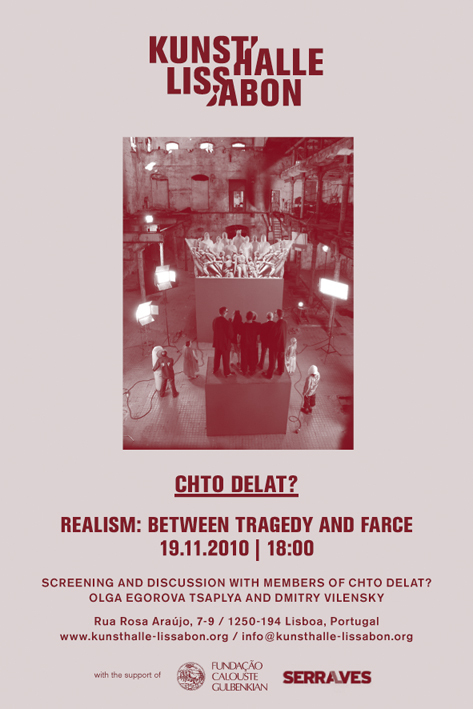
-
André Romão
Poemas Bárbaros - Barbarian Poems book launchKunsthalle Lissabon continues its publishing activity by launching Poemas Bárbaros | Barbarian Poems, an artist book collecting a set of poems written during 2011 by Lisbon-based artist André Romão. The title immediately suggests some of the conflict existing within the texts, that depart from the literary reference to the Barbarian, the one who doesn't speak Greek, and continue the artist's research on topics such as the history of violence or the dissolution of language and verbal communication.
André Romão
Co-published by Kunsthalle Lissabon and ATLAS Projectos
64 pages
Pt/Eng
18 x 11 cm
200 copies
ISBN: 978-989-97141-4-4SOLD OUT
For information and ordering please contact Kunsthalle Lissabon at: info@kunsthalle-lissabon.org or +351 912045650.
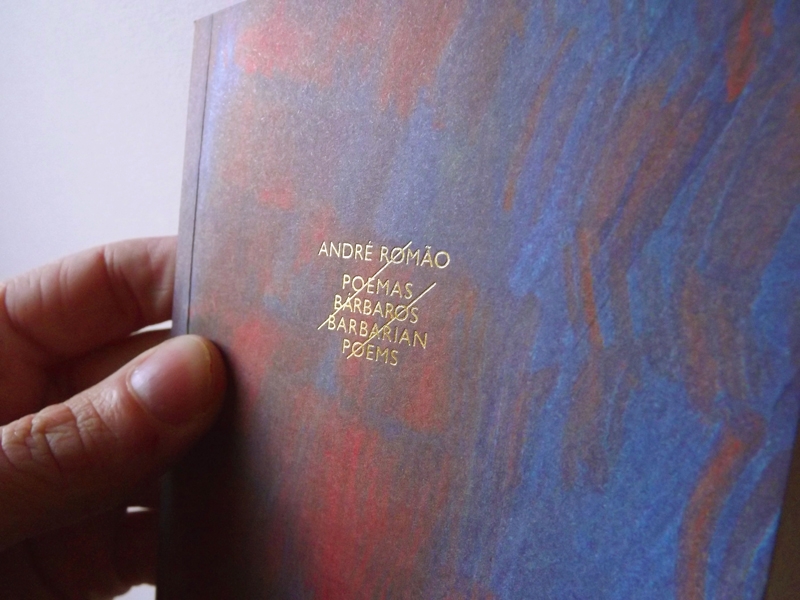
-
André Guedes
Lançamento do livro e leitura EquinoxEnsaios para uma Antológica is a monographic volume that compiles fifteen years (from 1999 to 2014) of André Guedes’ artistic practice.
This book presents four anthological sketches organized by four authors with diverse paths and interests as well as very different relations with the essay as a written format and as a tool. These proposals range from the anthology understood as a dialogue proposed by João Mourão and Luís Silva with André Guedes, who refuses the role of the artist as a simple object of study, recovering him as a subject, playing an active role in the task of thinking about his own work; to the anthology as a performative text proposed by Pedro Neves Marques, which aligned a contemporary historical-political narrative out of the artist's work; through the visual anthology of Liliana Coutinho, centered on the ethical and aesthetic possibilities of making community not only as a theme but also, and perhaps above all, as a modus operandi; or finally by Chris Sharp's exhibition-essay, which proposes a reading of Guedes's work based on an idea of affective closeness strengthened by the encounter between individuals, strangers or not. These four anthologies thus represent different impressions of one of the most relevant artistic practice that have been recently developed in Portugal.
A reading of Equinox (2009), a text written by Nathan Jones and André Guedes, will be the starting point for an informal conversation around the work of André Guedes and Ensaiois para uma Antológica.
Ensaios para uma Antológica was supported by Governo de Portugal/Secretaria de Estado da Cultura - Direção Geral das Artes (DGArtes) and by Coleção António Cachola.
André Guedes
Ensaios para uma Antológica
Co-published by Kunsthalle Lissabon and CURA.BOOKS
Edited by João Mourão e Luís Silva
Essays by André Guedes, Chris Sharp, João Mourão, Liliana Coutinho, Luís Silva and Pedro Neves Marques.
Design by Pedro Nora / noradesign.net
260 pages
Pt/Eng
300 copies
ISBN: 978-989-98213-4-7
€ 25,00 + packing and shipping
for additional information and orders info@kunsthalle-lissabon.org
Kunsthalle Lissabon is generously supported by Foundation for the Arts Initiatives and Teixeira de Freitas, Rodrigues e Associados.Acknowledgements: Teatro da Voz (Sílvia Real)
+ info about the publication
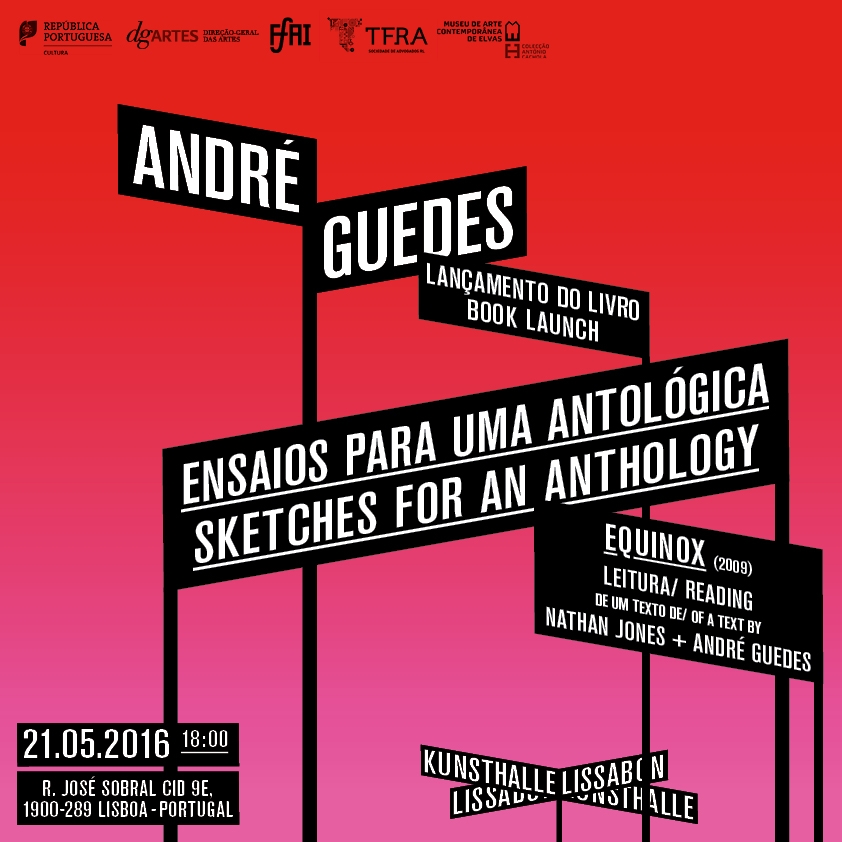
-
Carla Filipe
Lançamento do livro e arquivo faladoKunsthalle Lissabon continues its publishing activity by launching As primas da Bulgária (Cousins from Bulgaria), an artist book presenting Carla Filipe's research into young Portuguese citizens who went to study in the Socialist countries immediately after the April 25, 1974 revolution. Given the general lack of documentation on this subject, and using personal stories from the students, and how they now relate to those memories, As primas da Bulgária (Cousins from Bulgaria) documents, explores and reconstructs, in a fairly idiosyncratic manner, a largely unknown episode in contemporary Portuguese history. The book launch will also feature Spoken Archive, an oral narrative the artist will present from the research carried out and that, in addition to the publication now launched, already materialized in an solo show held at Kunstverein, Milan.
Carla Filipe was born in Aveiro in 1973. She lives and works in Porto. Filipe studied Fine Arts – Sculpture in Faculdade de Belas-Artes (Universidade do Porto) and has a master degree in Contemporary Artistic Practices from the same institution. A selection of her solo shows include As primas da Bulgária, Kunstverein, Milan (2012); Um olhar periférico sobre uma cultura, London, UK and Der Vierte Raum, Bremen (2012); Bordas de Alguidar, Galeria Graça Brandão, Lisbon (2011); Experiência Flutuante - Paisagens Gráficas, Galeria Nuno Centeno, Porto (2011); Saloio, Tapada das Necessidades' Greenhouse, Lisbon (2011); Deaf and Dumb Archive, Tranzit Display, Praga (2011); O povo reunido jamais será - representações gráficas, Museu do Neo-Realismo, V. F. Xira (2010); Precarious, Escape Fascination Kunsthalle Lissabon, Lisbon (2010). Her work has been featured in several group shows, namely Redundancy, GFLK, Bad Tölz (2012); Les ateliers de Rennes (2012); Gravity & Disgrace Ep. 1, CEGAC, Santiago de Compostela (2012); Art Situacions. Una mirada prospectiva, Arts Santa Mónica, Barcelona (2012); V Bienal de Jafre (2011); Prémio EDP Novos Artistas, Museu da Electricidade, Lisbon (2011); Manifesta 8, Murcia (2010). Filipe has been an active organizer and responsible for the most important artist-run spaces in Porto. She is represented by Galeria Nuno Centeno, Porto and Galeria Graça Brandão, Lisbon.
Kunsthalle Lissabon is generously supported by Teixeira de Freitas, Rodrigues e Associados.
+ info about the publication
